#at least until such time as they are all solidly established as A Future (Or Current) Thing
Explore tagged Tumblr posts
Text
now for the training yard scene, i would hazard a guess that this is nynaeve on the right and elayne on the left (mostly hidden by the tree, but i can see a bit of long reddish hair peeking out)

i know it would be insane and illogical to have egwene and gawyn miss meeting each other by 1 episode, but if the andoran arrival isn't until 3x02 and we also have an image of rand and lan training somewhere outside tar valon in 3x02, possibly indicating they've headed out on their trip, and now we're seeing possibly only our tanchico crew still around in the white tower for the quarterstaff fight, i can't help but worry! of course, it's entirely possible that egwene is somewhere in this scene too but just not visible from this particular angle, or that this takes place later in 3x02 and she's met gawyn earlier in the episode before leaving with rand & co, or that the quarterstaff scene isn't until 3x03 (which i actually think might make the most sense since if the tanchico crew aren't reaching tanchico until the back half of the season, they'll need a little something to fill up a 3x03 in the white tower, and then i'd guess they'll sit out the big rhuidean ep4; this would also allow gawyn and galad's 3x02 screentime to be focused on just getting to know them and the family dynamics, and then 3x03 we see more of them in a new setting here with the fight scene)
#i always gotta spend every season lead-up worrying about My Ships#at least until such time as they are all solidly established as A Future (Or Current) Thing#and that should be the case by the end of s3! depending on how the various early-season meetcutes go down#wot#wot book spoilers#gawene
17 notes
·
View notes
Note
Directors Commentary for Who We Were Before when Dove is hired for the Zemos or The Baron and the Dove when Helmut figures out Dove is pregnant 👀
💕💕💕💕
Well just make it impossible to choose why don't you?! Both? We'll look at both. Cause we can and I'm going to shake some words loose over the long weekend. (I thought for a good few minutes that I didn't have a divider bar for WWWB and then realized I'd just saved the file in a different location than all the other dividers for the sprawling series.)

LJH: Who We Were Before - C1. Something discovered & C2. How if becomes when
I wanted the opening chapter as a whole to show how strong the bond was between Helmut and Heike, the teamwork between them that felt solidly established and unbreakable. I think anything less than a partner that knows the best and worst and is choosing to be there anyway wouldn't have made sense for the lengths Helmut goes to in Captain America: Civil War.
Of course they'd be exacting in entrusting someone to become part of their lives. At the same time I wanted to peel away the layers and show how life in the household might once have been, structured but ... lighter, for lack of a better way to say it. (Forgive me. For a shorter workday my brain is still edging dangerously close to fried.) Hope. There's hope and life in the hallways of the Zemo household. Sure, Helmut and Heike are tired from the strenuous process of interviewing potential candidates to help with Carl, but that strain doesn't translate to sharper tempers - not with each other, not with any of the preexisting household staff, or those potential candidates left to interview that day.
As to how Dove becomes Nanny to Carl - I'm not sure if it's a single thing that can be pointed to as the reason. I wanted all three Zemos to have opinions, of sorts, in the hiring of Dove. Carl's little moment of hide-and-seek, allowing that early attachment to show without influence of anyone else in the household. Not to mention the fact that he was able to manage his way from wherever he was napping to interact with the potential candidates that would be charged with his care.
Circling back, though, to Helmut and Heike: one of my favorite things was showing their connection, that same wavelength flowing between them that took the need for additional dialogue because they were holding wordless conversations. A little look or tone emitted to convey something. We, just like Dove, are outsiders looking in - not quite catching all of what passes between the couple.

LJH: The Baron & The Dove - C13. Two weeks, one day and four hours after the great grate escape
Dove isn't even awake to witness the exact moment Helmut's brain offers the conclusion that she's pregnant. They've been chasing a fantasy that he's trying to nail down into some form of reality: a safe place, a future. They've hardly taken a single precaution to safeguard against the possibility that that future isn't possible - at least that Dove is aware of. For everything he's told her, warned her about, there's a good half dozen things or more that he's kept to himself. Old worries and new ones that he'll shoulder until she asks the right question, or it's no longer a concern... or it's forced.
It's the first night after they've found that little house at the end of the lane, and furnished it with at least the immediate needs. All the little things he's noticed that suddenly align and he suspects...
Excitement. Fear. Guilt. Listening to Dove sleep while he sits there staring at the bare walls of this house he means to make safe. For her. The future that's a lie, a hope, a dangerous daydream that's solidifying. Fear because if she is carrying his child, he's risking more than their lust-laden wants and desires. There's so much than can still go wrong, so much beyond his control. Old fears, with how close he came to losing Heike and Carl both. Thinking of them ushers in the bitter tasting guilt, sharper now for his bedding of the young woman that once was of the household. Heike and Carl are gone, yet this... feels like a fresh betrayal. Another promise broken. He misses them, yes, but that desperation to be reunited has shifted, softened, morphed into something else.
The near-certainty of that moment in the middle of the night is why Dove woke to find him sitting in bed vs sleeping, and why he rocketed out of said bed when she reached out to touch him.
In terms of when he first started wondering if maybe she was pregnant - I've always thought that he had an inkling on that ferry ride, when she fell asleep tucked against him. When she simply slept, rather than shifting and startling herself awake with dreams she refused to fully reveal.
#ask games#reply: ask games: director's cut#the long journey home related#LJH: B&D#LJH: WWWB#should we talk about Helmut's hop skip and jump from /oh shit/ to /that new life forming *WILL* be a Zemo/
4 notes
·
View notes
Text
ok some basic info about ogsd
- it is not one story, and there is not a main character or antagonist. each character is dynamic enough to be a protagonist or antagonist in their own right and context, it just depends whose perspective i’m writing from. think apple bobbing, they’re all apples. you could bob down and grab any of them for a story, and it’d be viable (hopefully. some newer characters are a little weak, like hilja or asher).
- the genre is realistic fiction, and there will not be magic (so sad. i’ll have to branch out to making fantasy aus lol).
- everything in the ogsd universe follows the flow of real time, and i cannot stop it. for example, the original characters just started middle school. they’re trying to adjust to the new setting, i’m trying to adjust to my favorite children (okay, no favorite character but a favorite. uh. edition i guess) not being in their natural habitat. because the redwood counselor mr solinski needs interaction. at least it evens out with how much i neglect blackwood and dogwood
- the story takes place in the real city of eau claire, wisconsin. however, i will take creative liberties as i’m unfamiliar with the area and kind of picked it at random. for example, my father informed me yesterday that the population there was 80% white (as if it isn’t here too) and i’d need less diversity to make it realistic. so i ignored that information lol
- i will randomly talk about characters you do not know because there are too many to store in the brain of someone who hasn’t had a one-fan self-created special interest for 3 years straight.
- all characters are mine, and are not inspired by real people. the closest you could really get is asher torosyan who was a self-insert in the original. however, that is no longer the case
- since it follows real time - i can write about events in the past and present, but never the future. while i have loose ideas about what could happen, i can’t set those in stone until it happens e.g. mira starting en pointe in april. it’s basically given that she will, but there’s no way to know for sure.
- for parts of their life that exist but have not been written, assume that they have autonomy during those times. would that be schrodinger’s stacy? maybe that’s not the right concept, but i’ve heard it be used in that context. quantum stacy ig
- once a piece of information is solidly established, it *cannot* be changed without an explicit reason unless it’s just flat-out wrong. for example, i changed some of the details about the school district’s history, and lily’s name had to be changed twice after i forgot the first and didn’t like the placeholder (hyacinth), but i can’t change the name of lily’s modeling agency, belle’s models & talent, without them legally doing it (it needs to change because i found out there’s another modeling agency named the belle agency in northeast wisconsin). on that note, i should actually make them start the legal processes now. good luck adjusting to middle school *and* a company rebrand, lily! :)
2 notes
·
View notes
Text
On Kong Kenan/Super-Man
It should've been him. He should've been the Superman of 5G/Future State/right now not Jon, and he should be the one getting an HBO Max series not Val. Hell he should be getting a movie!
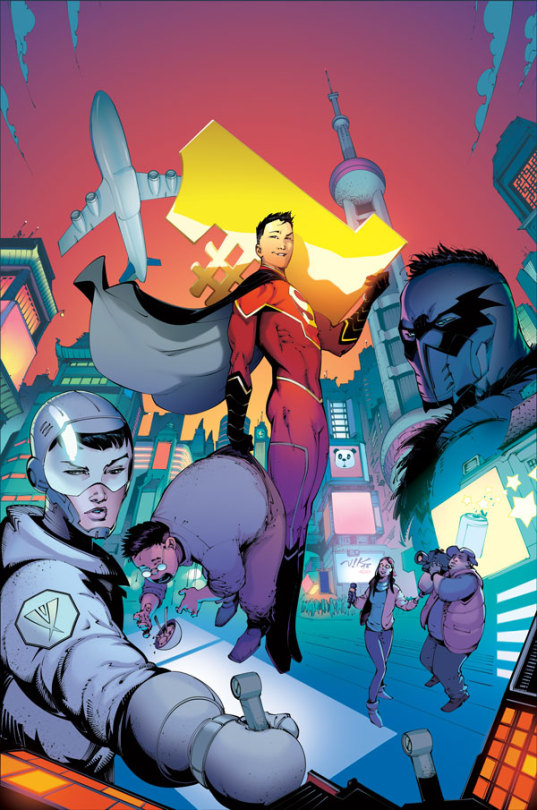
God this dude is literally the best legacy character Superman has ever gotten, wholly his own person with his own lore and status quo while still building on the idea of "Superman". I am so pissed at DC for essentially just dropping him after his ongoing ended, what the hell Lee? You keep trying to make the Wildstorm characters happen, I need you to get my man Yang another Kenan book.
Have to admit I was a bit nervous at first about whether or not Kenan would be a worthwhile character. Yang's New 52 Superman run had been a disappointment to me overall, with only the the arc where Superman has underground wrestling matches against forgotten gods really sticking with me. Now he was introducing a brand new Superman? Didn't feel like he had "earned" that yet. But from the first issue I was hooked on this new character.
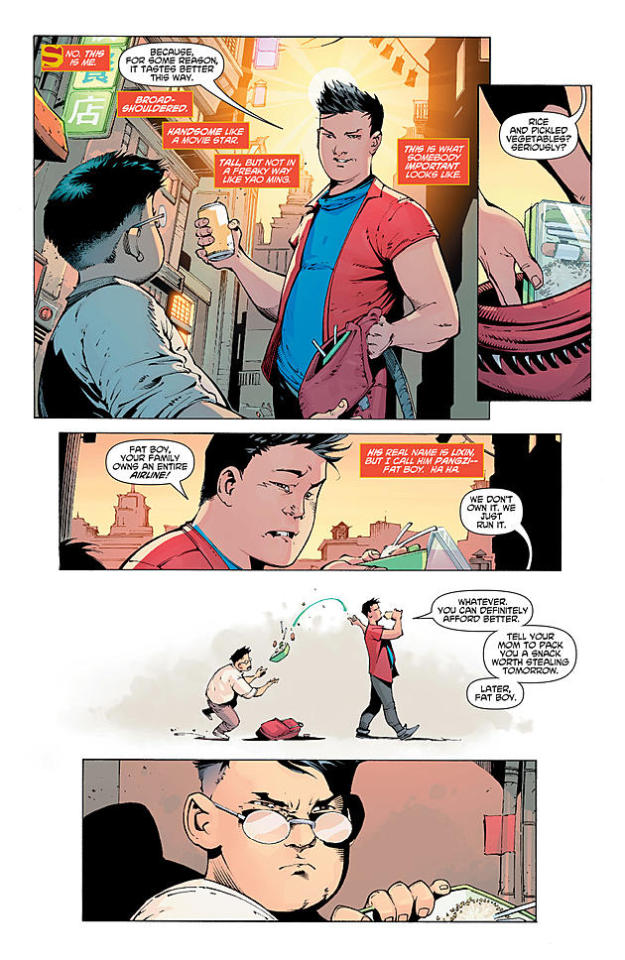
Kenan was unlike any other member of the Superfamily. He wasn't kind or sweet, he was an asshole! He was a bully! He was fantastic! Right from the start Kenan was set up to undergo a very different kind of character journey than the other members of the Superfamily. Empathy, humility, respect for people weaker than himself, these are all traits most heroes wearing the S-shield already posses by the time they first don the crest, but not Kenan.
Like all bullies he was even a bit of a coward himself at first, trying to bail on the experiment meant to give him Superman's powers right as it begins. After "saving" Lixin (the kid he bullies and steals lunch from every day) from Blue Condor he demands all the money Lixin has on him as payment. He's not courageous or selfless either at the start, Kenan is as much of an opposite of Superman as you can get short of being Bizarro. Learning the appeal of these traits formed the basis for his growth over the course of his series.
Seeing Yang bring in a lot of recognizable "Superman" elements in the series, but with a twist, was also great. Kenan is the one who bullies "Luo Lixin" rather than the traditional Clark/Lex friendship of Pre-Crisis and Birthright. Initially Kenan develops a crush on intrepid reporter for Primetime Shanghai, Laney Lan, but she dismisses him as too young and Kenan eventually ends up pursuing Avery Ho (Flash) instead. Baxi the Bat-Man of China has a similar relationship with Kenan as the traditional Superman/Batman in terms of being vitriolic best buds, however Baxi is the one who has the most respect for authority while Kenan is the rebel. Kenan is a part of the "Justice League of China" which does not meet with the approval of the already established Chinese superheroes, the Great Ten. That contrasts nicely with the good relationship the Justice Society and Justice League have, as well as seeing Yang lampshade the "Chinese copy" trope and incorporate that into his storytelling.
One of the funniest differences is how Kenan chooses to immediately reveal his identity as Super-Man to the world by taking off the compliance visor he was forced to wear, contrasting with Clark's choice to hide his identity. He was so eager to impress people that he never gave any thought to the danger he could put himself or his family in by revealing his identity until it was too late, something Clark is well aware of and has taken great pains to keep his identity secret. Was a missed opportunity for DC to have Kenan comment on Clark copying him for once when he outed himself under Bendis.
But one of the most poignant differences between Clark and Kenan is the gulf in separation between their relationship with their parents. Clark has a loving relationship with Ma and Pa Kent, trying to live up to their lessons as best he can. In contrast Kenan's mom was believed to have died in an airplane crash when he was just a child, and he never really knew her. His father was distant from him after that and the two weren't really close despite Kenan's attempts to impress him. So Kenan lacks that strong connection while still clearly loving both of them.
Pa Kent's death is one of the most tragic examples of Clark's love for his parents, and I've always been a fan of takes where Clark promises his father to fight for the powerless on Pa's deathbed. Kenan gets a similar scene at the start of his career, his dad "dies" (after being exposed as Flying General Dragon, a pro-democracy "supervillain" from the Chinese authorities perspective) and wants Kenan to promise he'll fight for Truth, Justice, and Democracy. But because Kenan's dad never really bonded with him, Kenan doesn't know what those mean, and can only promise that he never wants to see people die, something his father takes comfort in at least. In classic comic book fashion it's revealed that Dr. Omen, Kenan's "boss" and the one who gave him his powers, saved Kenan's father, because she is Kenan's mother! Kenan's relationship with his parents forms a lot of the crux of his character arc, and seeing how Yang utilizes the classic Superman concept of family kept the storytelling exciting.
Yang's brilliant exploration of the concept of "Superman" through the prism of Chinese culture was a great way to differentiate Kenan as well.
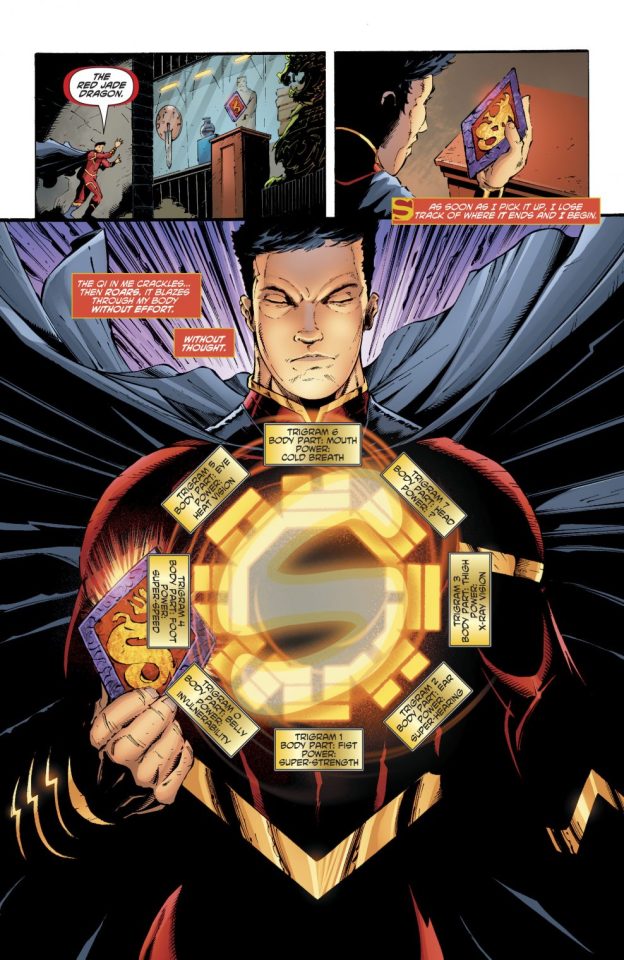
I absolutely freaking love how he tied to the concept of Qi to the S-shield in particular. Connecting the shape of the shield with the way Kenan has acquired his powers along the path of the Bagua (eight trigrams used in Taoism that represent the fundamental principles of reality), with his octagon S-shield outline representing all eight principles together, was mindblowing! So was the idea of restricting Kenan's access to his powers unless he was actually acting in a Superman manner, that tied his character growth to his power growth in an entertaining manner. There were so many characters and concepts that meshed Chinese and DC lore together, like how Emperor Super-Man was Kenan's "Doomsday", they even recreated that iconic dual kill shot! The Chinese Wonder Woman Peng Deilan, being based on the Chinese Legend of the White Snake! There was even some Korean mythology referenced with the Aqua-Man member of the JLC "Dragonson".
Yang also managed to do a Superman Blue/Superman Red story with Super-Man Yin/Super-Man Yang!
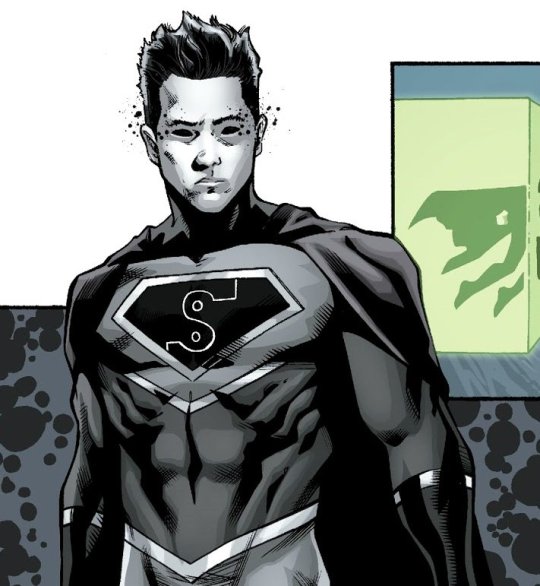
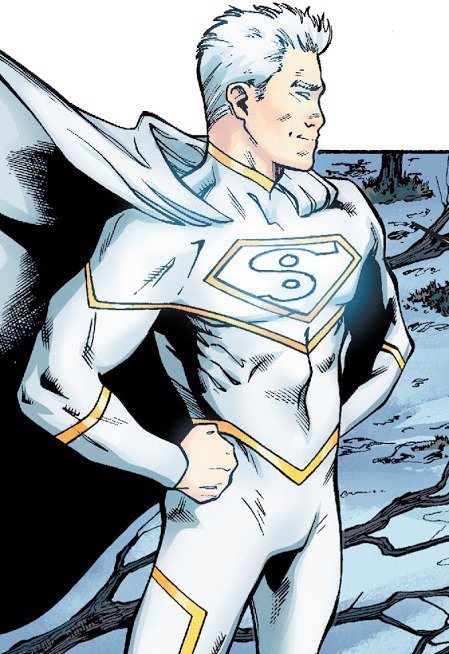
Shameful that it took me a while to realize what Gene Yang was doing but once I caught on I was touched. You can tell how much Yang loved Superman and his mythology, and how he was excited to incorporate as much from Clark as he could, while still using it in a way that was solidly Kenan's. And not just Superman's mythology, but the history and lore of the entire DC Universe. I-Ching got to be brought in, fleshed out, and used as Kenan's mentor! The "Yellow Peril" villain from Detective Comics #1, the comic DC gets its name from was brought in and revamped as I-Ching's twin brother All-Yang! Hats off to Yang for taking a racist caricature and attempting to make him into something more.
This series was a beautiful attempt by Gene Yang to build a space for Asian heroes and villains where they could be more than stereotypes, Kenan himself being a defiant mold-breaker in every regard as the complete opposite of most Asian characters in Western media (a jock, a bully, loves his dad but not on great terms with him, a powerhouse as a hero, etc). So much thought and hard work was poured into this by Yang and his team of artist collaborators.
Especially the costumes, man Kenan had so many great looks. From his starting outfit (which is my favorite Superman variant not worn by Clark himself), to the one with the Yin/Yang shield he acquired later on, to his Super-Man Yin & Super-Man Yang outfits, Kenan looked damn cool. Part of me is bummed they didn't go with the Chinese character shield they toyed around with, but I loved how Yang used the "s-shield" as a plot point, so I'm not too broken up over it.
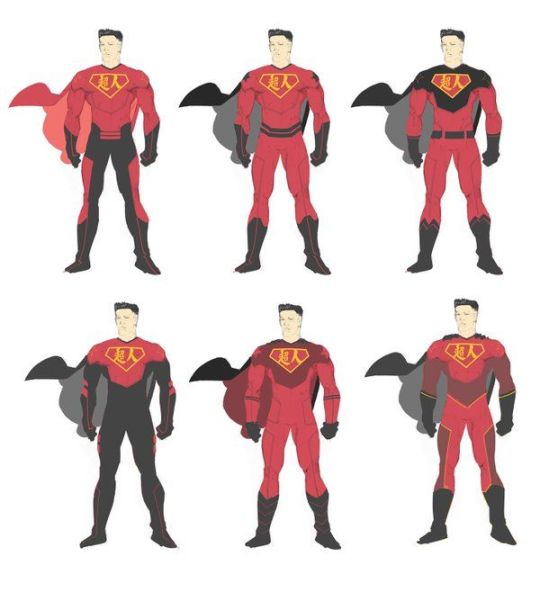
All that great work Yang did to build that space up has been more or less forgotten sadly. It was nice to see Kenan in the DC Asian Month Celebration issue. Avery is going to be in Justice Incarnate at least (unsurprising considering she was created by Williamson). So fucking bummed that Superman Family Adventures cartoon didn't happen, they were going to have Kenan and John Henry Irons in it! Would've been a dream come true for me to see Irons in animation again, and Kenan making the jump to outside media! Maybe that would've encouraged DC to let Yang keep writing New Super-Man, or at least encouraged them to use him elsewhere instead of allowing him fall into Limbo.
Unfortunately I'm not sure what the future holds for Kenan. Jon is being pushed as Clark's replacement in the comics, with DC keeping all the other contenders such as Kon benched. Calvin is leading the Justice Incarnate team likely due to the upcoming Coates reboot that will make Clark black. Val will probably get something once Taylor leaves Jon's book or once they officially announce the HBO Max show is happening. So where does that leave Kenan, my new favorite PoC legacy hero? Currently my only hope is that Yang is working on something for DC involving him. Yang left Batman/Superman, where I was hoping to see a Baxi/Kenan team up, to go work on "exciting other opportunities" per his Twitter. So fingers crossed that there's something in the works for Kenan!
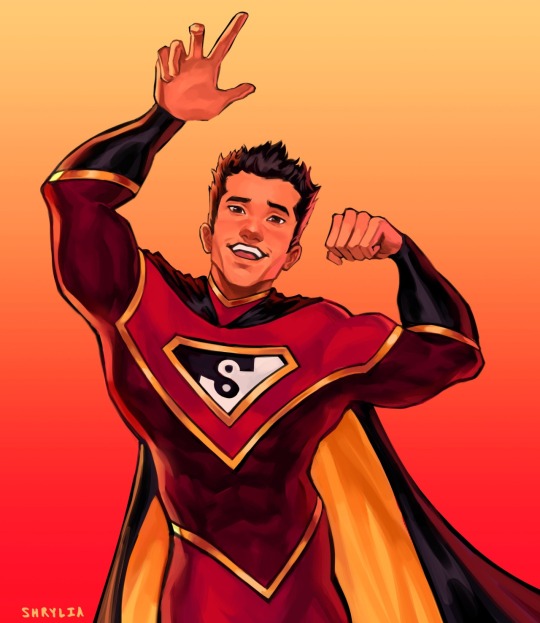
One day I hope he gets his day in the sun again.
147 notes
·
View notes
Note
Which Liam is the Driam Liam™️?
Hi, Nonny! Thanks so much for the ask.
Asian Liam is the Liam used when creating anything Driam, and not just because I am the hugest Asiam stan.
Driam has been around in the fandom longer than I have (I’m navigating my way through Year 4), and the pairing has always always always been Asian Liam Rys x Drake Walker until recently.
It’s fanon (established canon for fanfic).
The pairing is so simple, yet so complex: two lovers who desperately want … need … to be together but aren’t allowed is poignant and wrenching when done correctly.
It’s deep friendship and a pure love that carries through puberty to manhood. It’s first times, rites of passage, broken promises. It’s hard-ons and heartstrings. Angst, pining, longing … sneaking around for the briefest of clandestine moments, knowing that fate will eventually interfere …
MC doesn’t factor into the equation until long after Driam has solidly established their relationship and future plans based on Leo assuming the throne, which we know he won’t.
But Driam doesn’t know this.
Non-Driam stans tend to write the pairing with any Liam (Whiam, Bliam, Asiam) thinking they’re all the same person, but for me at least, they are not interchangeable. Each of the Liams differ from each other in a myriad of nuanced ways, which especially comes across in a Driam story.
In the right hands and with the right Liam (Asiam), Driam is beautiful heartbreak.
Based on my observations, Drake stans aren’t huge fans of Driam; slightly puzzling to me but that’s another topic for another time.
However, as best as my Driam knowledge goes, an avid Drake stan created the pairing of Driam: @debramcg1106! Her Forever series is must reading for any stan of Liam, Drake, and/or Driam. Her storytelling is amazing, and her Driam is just *chef’s kiss*. Did I mention the spicy af lemons???
If you … or anyone, really … is interested, Driam writers to check out: @debramcg1106, @sirbeepsalot, @kaitycole, @ao719, @dcbbw (me)!
20 notes
·
View notes
Note
Since your last post implied it I would love to know about your AU recommendations ❤ I am obsessed too!! Thanks in advance 🙏🏻
hello! I hope you don’t mind if I just make a basic list of some of the AU stories I have read or want to read. Not in any order I just went through my bookmarks on AO3 :) Also I need to read more...Under the cut because it got too long!
Angel's Wild (not gonna lie this is my favorite fic. I have read this almost a dozen times now)
Summary: But that’s the whole reason he’s here, isn’t it? He’s not out here hunting Humans. He’s not even hunting deer, or bears, or anything else that featured in Bambi. He’s out here, freezing his nuts off every night, because he’s hunting Angels.
Sometimes Dean wishes that Angels were like how they’re described in the Bible. How people from time too old for him to care much about thought Angels were messengers and warriors of God, protectors of Humans. He knows that how they’re really described in the Bible is actually pretty terrifying, but at least they were told by God that they’re supposed to love Humans, right?
That’s a thousand times better than what Angels really turned out to be.
Checked Out
Summary: Castiel Novak can think of many writers who would not be welcome under the roof of Heaven’s Gate library, where he is the librarian: Ayn Rand ranks highly (no explanation needed), as does Charles Dickens (he hasn’t forgiven Charles for the month he lost to The Pickwick Papers). And, of course, Dean Winchester. Dean Winchester, local author and obvious a-hole, who is entirely too handsome to be true and who is clearly totally lacking in profundity, intelligence, sincerity, and self-awareness. Unfortunately, though, Dean’s been invited to do a book signing at Heaven’s Gate - and Castiel’s about to be confronted by some unexpected feelings when he finally meets Dean for the first time.
A Ghost Story
Summary: Castiel Novak has haunted his family's estate for 150 years, awaiting the return of his lost love. Upon their reunion, Dean Winchester learns of his past reincarnation. After the night of Castiel's resurrection, the two try to find out why they've been given a second chance. The answers may be hidden in the forgotten memories of Dean's former life - but sometimes the truth is better left buried.
Patient Love
Summary: Castiel Novak is 27 when he suddenly loses his twin brother Jimmy, and his whole world turns to ashes. How do you deal with losing half of yourself when your whole life always revolved around the two of you, like yin and yang and black and white? How do you deal with a broken soul and old demons looming over you with no one to hold you back anymore?
After 10 years as a Navy Special Warfare Operator and more than a dozen deployments in both Afghanistan and Iraq, a battlefield injury forces 28-year-old Chief Petty Officer Dean Winchester to chose between being stuck behind a desk for the rest of his career or going back to civil life. When he learns about his friend Jimmy’s death, Dean makes his way back to Kansas with his heart in his throat and broken pieces at his feet.
Things are already complicated and painful enough as it is, but when former lovers Dean Winchester and Castiel Novak meet again after 10 years of radio silence and a galaxy of wounds and scars solidly standing between them, it feels like both a curse and a blessing has been placed on them both. Is there any hope in putting back their broken pieces together after a decade, and how do you deal with grief and broken dreams?
The Unbroken
Summary: Dean’s life had been made of running. He ran from a curse that had desolated his life ever since he was a child — whenever he got hurt, he turned into a goddamn human-torch, killing everyone around him — and he ran from himself and his own self-loathing.
But managing all that at the end of a world full of Croats lurking around every corner was easier said than done.
Until a mysterious man with tousled dark hair paired with blue eyes as clear as the sky during a hot summer’s day stopped him from free falling, literally. In one fell swoop, the stranger had not only saved his life but also calmed the wildfire threatening to burn everything in its wake.
There was something about Castiel that made Dean want to stop running but also hid something darker — something Dean couldn’t quite put his finger on. And between soft, pillowy lips and feather-like fingerprints, Cas could very well shatter Dean’s world and maybe help save the whole world in return.
While You Were Sleeping
Summary: A Destiel version of While You Were Sleeping! Castiel is alone and floundering. He has a crush on one of the passengers who passes through his subway station every morning. When the man gets pushed onto the tracks, Cas saves him. But when they get to the hospital there's a mix up and Cas finds himself engaged to a complete stranger. Enter, the rest of the family, including big brother Dean. How will Cas navigate the relationship with his supposed future in-laws? What will he do when Sam finally wakes up? And why can't he stop thinking about Dean?
Purgatory, director's cut
Summary: this doesn’t have a summary but it is dean and cas in purgatory and it’s soooo cool! I promise it’s amazing and worth the read!
Basic Lessons in First Aid, Magical or Otherwise
Summary: Most people probably wouldn’t take the naked, heavily wounded man they found in an alley home with them. Most people probably wouldn’t also offer that man a place to stay and become his best friend after realizing he’s suffering from an intense case of post-traumatic retrograde amnesia. Most people probably wouldn’t then risk almost everything they know to save said man, and maybe save the world in the process.
But then again, Dean Winchester, RN (with a specialty in supernatural care), has never been like most people. He may not have a magical bone in his body, unlike his brother Sam, but he’ll do whatever it takes to help. Even if Castiel has questionable opinions about Star Trek.
What Greater Gift
Summary: Story idea: The most wanted woman in town has announced that she’ll only marry the one who can open her front door with the key around her cat’s neck. Many men try to hunt the cat down, chase and trap it, but to no avail, the cat is simply too quick, smart and clever, and always finds a way to evade and avoid them. You are the first one to figure out the obvious: Do not chase the cat. The cat is befriendable. Get the cat to trust you, to genuinely enjoy your company, and you can hang out with the cat. You may eventually be allowed to touch the cat. The cat will freely let you take the key.
From a prompt found on Tumblr. Saw this and I couldn't resist a Destiel AU, and I've been wanting to write Witch!Cas for ages.
I know when you go down all your darkest roads
Summary: Dean and Castiel go undercover as a couple going through therapy, in order to catch a monster that specifically targets couples dealing with issues, feeding on their distress, anger, and pain.
They end up going through a lot more than a case, unfolding feelings left untold for so long, discovering parts of each other they never intended to uncover.
But will the feelings raging inside them be enough to bring their walls down?
A Fish Out of Water
Summary: To tie up the loose ends of a hunt, Dean is forced to go undercover and visit Brock Pleasure Ranch, a horrifying establishment that markets its inhabitants to people with ‘monstrous’ tastes.
It should have been a simple thing, to persuade a mer to give him a few scales for a spell. All part of the usual Winchester byline: saving people, hunting things.
But Castiel is far less of a ‘thing’ than Dean expected. He might not be human, but he’s definitely a person. And that means he needs saving, too.
The Way to a Man’s Heart is Through Chlamydia
Summary: Dean doesn't expect to see his one night stand again, but then again he also doesn't expect to find out he has an STD. Sometimes life is hilarious like that.
Just as lost as I
Summary: Dean's been in love with Castiel for centuries. He keeps it buried, never letting himself get too close, but when Castiel goes missing he doesn't hesitate. He's going to find him if it’s the last thing he ever does.
Love Bites
Summary: Cas Novak graduated with a 4.0 in Mathematics, but not even Naomi Novak’s money could help him at job interviews. Anxious and dissatisfied with life, at nearly thirty he’s still washing dishes in the back of his best friend Hannah’s café.Until one night when his cat drags an injured bat into his apartment.
Dean may be a vampire, but he’s not an asshole (well, not much.) He feels like he owes the awkward guy for rescuing him from the cat’s clutches, so he sets about changing Cas's life.
A silly story about families who aren’t quite what they seem, fake boyfriends, and falling in love with someone who’s never, technically, met you.
The Bad Cop, Worse Cop Adventures of Freckles and Feathers
Summary: Miami. A place with beaches, babes, palm trees, and a growing drug-fueled crime organization. To help combat the drugs littering the streets, Captain Singer puts together a Tactical Narcotics Team composed of Miami's two finest and fearless officers. Charming casanova Dean Winchester has fought tooth and nail, rising through the ranks for this position. Trench coat toting Castiel Novak knows more hand-to-hand combative techniques than he does people skills. Between Dean's big mouth and Castiel's take-no-shit attitude, their introductory meeting ends on a less than stellar note and a couple of hard to shake nicknames.
After six months of partnership, the nicknames have stuck and so has the sexual tension. When a murder in the middle of the night launches their biggest lead on a cleverly evasive drug lord, Dean is shocked to find Sam at the center of it. Sam comes clean with his involvement and Charlie, their witness, seeks revenge against the man responsible for killing her friend. As the stakes rise higher so do Dean’s feelings putting everything in jeopardy. Is a cop with everything to prove, a cop with everything to lose, one computer hacker witness, and a damn good ADA enough to save the day?
The Care and Feeding of Castiel
Summary: Dean’s quiet time in the bunker is interrupted by some stranger-than-usual behavior from his angel. Oh, and feathers...there are a lot of those, too.
First Gentleman Wanted
Summary: President of the United States Castiel Novak is popular, charismatic, and knee-deep in campaigning for a second term. He’d be the ideal candidate if it weren’t for the fact that he hasn’t dated once while in political office. With his opponent’s relentless PR team calling him incapable of emotional commitment, Castiel’s staff decides to remedy the situation by finding their boss a fake, picture-perfect boyfriend. And when Dean Winchester enters the scene, he and Cas become America’s new favorite couple, except they’ve got a whole lot of history between them and complicated feelings to resolve.
The Graveyard Shift
Summary: Dean’s favourite coffee shop, The Graveyard Shift, is only open after the sun goes down. Which is perfect for him, because that’s exactly when he craves coffee the most while doing the overnight at the fire hall. The coffee shop’s owner is pretty perfect too, but it’s kind of a bummer that Dean never gets to see Cas during the day. In a world where the supernatural live more or less in peace with the rest of humanity, it’s a little impolite to ask Cas just what he really is - or what his dark past entails.
The Path of Fireflies
Summary: After his humanity is restored, Dean wakes up in bed with Castiel, a wedding ring, and no memory of the past twelve years.
The Five People You Meet in Heaven
Summary: Heaven is white.Well. Isn’t that fucking stereotypical.-Dean isn’t really sure how he got here. Or even why he’s here. And hell, for all the times the Winchesters have died, he thinks he ought to know the drill by now. But what he doesn’t know is when most folks go, they find something different.
There’s a system God put in place. That when you’re gone (for good), there are a couple things you gotta do first. There are five people waiting for you.
They are the five people you meet in heaven.
Doing this made me realize I need to read more longer fics. I usually just read the short ficlets on tumblr but I need to broaden my horizon and read more. But yes! These are the AU’s currently in my bookmarks. Hope you find one to enjoy :)
19 notes
·
View notes
Text
Avenge My Twistery Depth — Thoughts on: Trail of the Twister (TOT)
Previous Metas: SCK/SCK2, STFD, MHM, TRT, FIN, SSH, DOG, CAR, DDI, SHA, CUR, CLK, TRN, DAN, CRE, ICE, CRY, VEN, HAU, RAN, WAC
Hello and welcome to a Nancy Drew meta series! 30 metas, 30 Nancy Drew Games that I’m comfortable with doing meta about. Hot takes, cold takes, and just Takes will abound, but one thing’s for sure: they’ll all be longer than I mean them to be.
Each meta will have different distinct sections: an Introduction, an exploration of the Title, an explanation of the Mystery, a run-through of the Suspects. Then, I’ll tackle some of my favorite and least favorite things about the game, and finish it off with ideas on how to improve it.
If any game requires an extra section or two, they’ll be listed in the paragraph above, along with links to previous metas.
These metas are not spoiler free, though I’ll list any games/media that they might spoil here: TOT, WAC, mentions of GTH.
The Intro:
Let’s talk about Trail of the Twister, shall we? No clever intro, no pun, no sassy statement on the quality (whether lacking or overflowing) of the game…let’s just Talk.
Like I said at the beginning of my WAC meta, TOT is one of two games that doesn’t really fit into a category besides it and WAC demonstrating HER’s growing pains. The world opens (kinda), the characters get a little deeper (kinda) and a few new things are tried with plots and character (to varying degrees of success). Both WAC and TOT — but especially TOT — represent a shift in the tone of the games and their approach. You can ascribe this to a lot of reasons — an aging fanbase, technology marching on, a new writer in the mix — but you really can’t ignore it, no matter if you’re a Classic Games Elitist or a Newer Games Snob (or neither one).
To paraphrase a fabulous song, there’s something there that wasn’t there before.
This is not me saying in any way that TOT is a fabulous — or even moderately successful — game. In fact, it whiffs a lot where WAC hit solidly, which makes playing them one after the other a sort of chore; WAC is weighed down by the knowledge of what comes next (after such a brief respite from games like ICE, HAU, and RAN), and TOT’s repetitive chore list seems even bleaker after the snack shop and secret societies of WAC.
Which is truly unfortunate, because hiding behind the rat traps and the car chases (or drives, if you drive like a normal person in this game) and the endless moon chunk offerings is one heck of a story. Unfinished and beleaguered and (to my suspicions) censored as it is, there is a definite, multilayered, morally ambiguous, honest-to-moon-chunk story in TOT.
Like I said, something there that wasn’t there before.
Playing through the games in order, it seems like the reason WAC is so solid is, in part, because the games before it have so little cohesive story as to be laughable. Playing them out of order will show you that though WAC does come off a little better than it actually is due to the games that came before it, it’s also actually a step-up from a lot of games in the complexity of its plot and characters. At this point in the series that’s about to happen a lot, but WAC is the first real instance where you get it. Like I said, these two games mark a tonal and approach-based shift in the games.
So let’s turn our attention to TOT.
There are a lot of things that bog down this game — it feels sometimes as if you’re simply going through Farmville-esque tasks to get from Point A to Point B — but its plot and characters (save in one large instance) aren’t actually the culprits. Surprisingly enough, we have a mystery here with enough twists, turns, small crimes, and red herrings to make for a perfectly serviceable plot with relatively well-developed (for the length of the game) characters (whom I’ll go into more below).
A huge difference from a lot of the games is that we have a prominent unseen character who isn’t the one who hired Nancy or who is part of the historical background. Brooke’s actions actively move the plot along no matter what Nancy does, and I do like that the world of TOT goes on spinning (as it were) without Nancy driving everything.
You get the sense that Nancy truly was just dropped into the middle of this without having any control over the situation, and that she spends the entire game (or most of it) playing catch-up, rather than being on the scene for the crime(s) or arriving shortly thereafter.
In TOT, this sabotage has been going on for a while — the competition is nearly over, in fact — and Nancy has to actually do some detective work to even get caught up, let alone to try to step a few feet in front of the guilty party.
One interesting thing is what TOT and WAC share: they both feature casts who are only a few years off of Nancy’s age; in WAC, they’re a tiny bit younger, while in TOT, they’re a tiny bit older. Nancy, being Nancy, is much more in her element with the ages of her suspects in TOT than she is with high schoolers — with how much time Nancy spends around people significantly older than her, I’d be shocked if she got along well with high schoolers when she was in high school herself.
As a side note, I know it’s sort of a fandom thing that Nancy gets along well with children, but honestly outside of Lucas, it’s not something we really see (no, I’m not counting pelting Freddie with snow 10 times sans mercy as getting along with children) — and honestly Lucas is just charming, so I see no reason why Nancy wouldn’t get along with him. Generally speaking, kids who grow up the way Nancy has [especially as an only child] are far more comfortable with ‘adults’ — well established, 35/40+ adults, who make up the majority of her suspect pools — than they are with peers or children.
There’s also a great deal of care taken with making all the suspects (mostly) equally likely for a large portion of the game; it’s not until past the halfway point that a suspect (Chase) is cleared due to his confession of a different crime, and even then, he doesn’t really become Nancy’s helper, as is the usual case with cleared suspects. This is actually one of the few games where Nancy doesn’t really have a helper; she relies on herself, the Hardy Boys, and (questionably) P. G. Krolmeister to get the job done.
And speaking of the Hardy Boys…you knew an intro wouldn’t be complete without my mentioning them, hush.
The Hardy Boys are arguably the set piece that benefit most from Nik’s writing (and yes, I’m going to ascribe it to him; he’s the most prominent variable). Don’t get me wrong, the Hardy Boys were great before, but the Nik games are where they start attaining a place of more prominence and solidify their distinct personalities other than “focused killjoy and playful scamp”. In this game, you get more of Frank’s protectiveness (directed towards Nancy) and Joe’s actual sleuthing abilities — not the least of which because this game coincides with that DS Masterpiece “Treasure on the Tracks”.
Oh yeah, we’re going there. It’s relevant.
Treasure on the Tracks, as mentioned, was a game for the Nintendo DS (and the only one, mind you) focusing on the Hardy Boys. In the game (as in TOT), they’re tracking down the Romanov treasure with the help of a surprising ally — Samantha Quick herself. Samantha is under orders (from who, she never says, but a future game makes it obvious) to help the boys find the treasure aboard the royal train that the Romanovs used to own.
And yes, I would have loved that to be a joint Nancy Drew/Hardy Boys PC game, but I’ll push the bitterness aside for the facts. Which are that this game has a rad premise and would have been a very cool addition to the ND series…but I digress. Regardless, that’s what the boys are doing during TOT, so we get little hints to their investigation as well as having them help Nancy out.
I love that the Hardy Boys have an actual mystery that they’re investigating, as beginning with this game we see a lot more of their ‘agent’ side being brought out. It’s nice to feel that Nancy isn’t alone out there fighting against the forces of evil, and gives excuses to have the Hardy Boys in the games more, so I’m a big fan in general. It also helps build them up as investigators; while they offer hints to Nancy a lot, we don’t get to see them doing a lot of spy/detective work, and it’s lovely to be able to see it here.
And I love their sibling banter. It’s obvious that JVS and Rob Jones have a lot of fun with their roles, and it really lightens and enhances any Nancy Drew game that they’re in.
The last interesting thing that I’ll point out before diving into the game itself is what TOT does for the world of Nancy Drew. Beginning with this game, we start the tradition of each game leading directly into the next one; for her help in TOT, Krolmeister sends her to his favorite ryokan in Japan, which leads to her being hired for CAP; her absence and fight with Ned in CAP lead her back home for the Clues Challenge in ASH, and so on and so forth.
It really makes the world feel solid and cohesive, and lets our characters grow and shift and change without making it feel episodic or sudden. The Nancy of SPY is quite different from the Nancy of TOT in how she behaves and tackles mysteries, but her character growth throughout the games in between make it feel right and natural — like actual character growth.
The Title:
As a title, “Trail of the Twister” isn’t bad — it’s got that alliteration that ND books tend to like doing, and makes it feel a little classic. It also gets a play with words in there — you’re tracing the actual trail of the actual twister, and you’re also walking through the evidence left behind (aka a trail) of a twisting plot. Solid, if not exceptional, with its only real detriment being the hilarious acronym (TOT).
The book it’s (loosely) based off of is called “The Mystery of Tornado Alley” which, obvious to anyone with eyes, is a much worse title while telling us the same thing. It also doesn’t apply to the game as much – you’re not figuring out a mystery as much as unwinding the tangled threads of character motivations — and is supremely clunky to boot.
The Mystery:
Called in by P.G. Krolmeister to go undercover, Nancy joins a team of storm-chasers bent on winning a grant for their research — and beating the opposing team that wants the same thing. Nancy begins the mystery by finding a tin box full of cash (payment for an as-of-yet unspecified action) and it spirals from there, putting the not-so-amateur teen sleuth through her paces learning about tornados and storms, taking pictures, and trying her best to keep everyone happy and working towards the money.
It’s not as easy as it sounds, however. There are competing forces at work outside (and sometimes within) the two teams, and the personalities of the storm-chasers that Nancy must investigate mean that no one trusts anyone else. Things continue to go wrong and Nancy chases down the clues until the mother of all tornados hits town, and our culprit takes advantage of the distraction…
I mentioned above some censorship that I suspect went on in this game, and I’ll talk about it here. Given the darker themes of this game and the mentions of death and serious injury (more than most other games in the series at this point), I would say part of the reason why our story is a little more…displeasing, especially by the end, is that HER was really intent on the 10 part of the 10+ rating.
There’s lots to explore — the Ma storyline that goes nowhere, the collateral damage of these tornadoes, the fact that our cast is filled with genuinely unpleasant criminals — and yet it gets glanced over while feeling like the game is building up to it. Like CRE and ICE where I postulated a lot of the attention went to the new engine, I’m going to postulate here that the reason why we have hanging plot threads and injustice at the end (which I’ll talk about later) is that the game was censored by the HER bigwigs to ensure it still fit in a 10+ rating.
As a mystery, like I said above, there’s absolutely nothing wrong here. We’ve got plenty of means/motive/opportunity spread out in our cast (and in the periphery cast, just to keep things interesting), the threads and smaller crimes/wrongdoings/etc. are realistic in scope and in motive to keep them hidden, and it’s the personalities of the suspects that give us our conflict and tension, rather than random “interferences” by the writers. And speaking of our suspects, let’s go to the other area that TOT does (almost) nothing wrong.
The Suspects:
First off is Chase Releford, a junior who took Scott’s class for a science credit who got super interested in the actual work. The team’s handyman, Chase has noticed (and fixed, and fixed again) the equipment acting up, and is being stretched pretty thin in order to keep it all shipshape and in working order.
He’s also one of Nancy’s sources of Pa Pennies, if you wanna spend hours doing circuit boards.
As a culprit, Chase is a great option (which is a sentiment you’ll hear repeated for all of our suspects, never fear). He’s secretly spending his time looking for oil with Pa’s divining rods, which puts two crimes on his conscience (stealing the rods and not working on company time) and helps the team fall even further behind. It’s important to note that for a large chunk of this game, the likelihood of the suspect also hinges on how much they want Scott to fail, and Chase is pretty much the only one without any real anger towards Scott.
The owner of the local general store, Pa Ochs might be a surprising option to put ahead of Chase in order of culprit likelihood/suitability, but I stand by it. Having lost his wife (Betsy “Ma” Ochs) to a tornado (the warning sirens, which were Scott’s responsibility, didn’t go off), Pa alone mans the counter, helping Nancy find everything she needs — for a price, of course.
The price being annoyingly hard to get Pa Pennies. Unless you exploit a glitch.
Here’s where we start with the culprit possibilities that have an actual grudge against Scott. Though not as angry as he could be, Pa is deeply hurt by the loss of his wife Betsy, and has grounds for an axe to grind with Scott. As much as I would have loved to have the ‘friendly general store owner’ be the culprit, it would have been like a mix of DOG’s Emily and FIN’s Joseph (minus the Crazy), and it’s (sadly) best to leave that ground alone without re-treading it.
Frosty Harlow is next up; a second-year grad student in digital media, Frosty got his nickname (his real name is Tobias) from his storm photography and is, well, trying to re-capture that lightning in a bottle.
He also screams like a little girl. So that’s fun.
Like Chase and Pa, Frosty is a wonderful option for a culprit. His crime is selling university property (the video of the storm he and Nancy shot) to an aspiring photographer (who happens to be on the rival team) to help them get a toehold into the business, along with working with Debbie to try to stress Scott into quitting.
What really makes Frosty stand out is that, unlike Chase, Frosty doesn’t feel bad about what he did at all. He also holds far more animosity towards Scott than Pa does, and has a little more…innate anger as a person.
If you haven’t noticed by now, we’re going in order of “worst” culprit option to “best” (and then the actual culprit), and it really says something about how fleshed out these characters already are that we start with people who are solid options to begin with.
Though only appearing vocally and for a few minutes total of the game’s runtime, I’m going to list Brooke Tavanah as our next most likely culprit — in part because, well, she kind of is our culprit. The leader of the rival storm-chasing team, Brooke offered Scott money to sabotage his own team to let her team win the grant — an offer that he takes her up on.
Of course, Brooke isn’t the only one sleeping with the enemy (so to speak) to ensure her team’s victory; her videographer, Erin, is apparently so talentless as to need to buy footage from Scott’s team as well.
Things don’t exactly look great for the Kingston University team — as they can’t really get ahead even through sabotage and skullduggery, and one does wonder if they’d even be able to put the grant to good use. That, of course, is not the point; Brooke wants her team to win, come hell or high…wind…and a little thing like scientific ability isn’t going to stop her.
(Interestingly enough, this is the first of three times we’ll see Kingston University pop up; we meet their alumni again in TMB and DED).
I love that Brooke is guilty, because so often in Nancy Drew games the tendency is to implicate an unseen character and then to have that implication be a poorly done red herring. Instead, Brooke isn’t a distraction, nor a smoke screen — she’s just another piece of the puzzle.
Our last non-Culprit (by the games’ common definition) suspect is Debbie Kircum, a recent PhD graduate who is on her fifth time working with Scott in chase season, and who has gotten a lucrative offer to teach at a university in New York.
Worrying that Scott would let his resentment towards the college hurt their chances in the competition, Debbie leads the conspiracy to stress him out so much that he just quits. I’ll talk more about this later, but it is both one of my favorite and least favorite things about this game. For now, I’ll say that her plan works…but not the way that she planned; for her and lots of other suspects in this and upcoming games, the quote “the price for getting what you want is getting what you once wanted” works perfectly to describe their arcs.
As a culprit, (as Debbie fully qualifies as a culprit), Debbie certainly has the shortsightedness and nastiness that Nancy Drew culprits tend to have. She’s extremely good at getting what she wants…but see the quote in the previous paragraph.
She also over-contours her cheeks so much that it looks like someone slapped her with an open compact of bronzer.
That takes us to our final culprit and character, Scott Varnell, genius professor of meteorology and the leader of the Canute team. Scott is my personal favorite character not just because he’s the most interesting, but because he’s a tragic figure who isn’t historical/dead, and those are a bit of a rarity in Nancy Drew games, especially at this point.
Being an expert on tornadoes yet denied tenure based on his personality, rather than his academic prowess (a gripe I share as it applies to jobs/academia), Scott holds a grudge against those who don’t recognize his contributions to meteorology and to the study of tornadoes specifically. Unbeknownst to him, two members of his four-man team have been conspiring to stress him out so badly that he’ll just quit, as they think he’ll be a hindrance (again, due to his personality) in winning the competition.
Scott is in some ways the obvious option, and yet the game never turns into a howdunnit. Throughout the mystery he tends to be the prime suspect, but is also the prime victim — a dichotomy we’ve never seen before in the Nancy Drew Games. I’ll talk more about Scott below (a sentence increasingly common in this meta), but I both love and hate him as the culprit, and that’s something new (and interesting) that TOT brings as well.
The Favorite:
Don’t worry, we’ll get into TOT’s myriad flaws soon enough, but for now I want to focus on what it does right.
The first thing the game nails is the Hardy Boys. Their inclusion, their plot, their characterization, the voice acting — all of it is nigh-flawless, and is by far the most enjoyable part of the game. Don’t get me wrong, the Hardy Boys are usually quite far up there on the list of things I love about a game with them in it, but they really start to shine more in TOT, gaining some character development, plot relevance, and just overall depth.
Oddly (or perhaps not oddly at all) I don’t have a favorite moment nor a favorite puzzle in this game; barring that, I’ll talk about some of the great threads to the game, rather than any particular moment/puzzle that stands out.
I love that we get new and interesting layers to our story and characters. As I mentioned briefly above, there’s a real sense of the world existing before Nancy’s arrival, which works wonders for the world of the games, and our characters here are more layered, more distinct, and more ‘realistic’ (for the value of ‘realism’ in stories) than they ever have been before.
This is a game unafraid to deal with the topics of death and mistakes, and that accounts for part of the depth to the game as well. No, not the whole “Where’s Ma” thing — which I fully believe to just be a script that didn’t fire/didn’t stop firing in the game’s code after finding the newspaper that says exactly what happened to Ma — I’m talking about Scott’s mistake in the tornado warning system, Debbie and Frosty’s mistakes in dealing with Scott (which I’ll talk more about), and even Brooke’s miscalculations that lead to the ending of the game. Everyone here deals with the fallout of their mistakes, and it’s how they handle it that forms the basis for our plot.
It’s a seemingly small thing, but I love the sheer level of detail in this game. You can click on everything, read everything, explore everywhere — there’s a lot of information crammed into the game that sometimes you won’t get until the second or third replay (that is, if you have the stomach to play through this game repeatedly).
The use of our tertiary NPCs (Brooke, Krolmeister, Erin) is also inspired; they help the world feel whole and varied rather than existing simply for the benefit of the game, and show that Nancy doesn’t have control over everything when she’s investigating — and that she can be wrong in her focus of investigating (whether because she pays too much or not enough attention to the ‘minor’ characters).
Speaking of characters, I also love that our characters in this game – our suspects — are able to be fully formed without (on purpose, I feel) being particularly likable. It’s always fun to get a cast of characters that are hostile to Nancy, but TOT’s characters are slightly different from that: they just don’t care about her. She’s another intern to them, nigh-invisible except when they need a chore done. Nancy also doesn’t really try to befriend anyone because of it, and I like that too. Sometimes, a game should just be 1 vs 4, with some backup in the wings courtesy of phone friends.
The last facet of the game that I love is Scott himself as a character. Sure he’s cantankerous, blunt, egotistical, and a thousand other things, but the game is very clear that these ‘faults’ don’t make him anything other than what he is — a brilliant meteorologist and the foremost mind when it comes to tornadoes and tornadogenesis. The university undervalues him, but the team really can’t function without him, sabotage or no sabotage.
His motive for the sabotage isn’t the money nor fame — it’s simple tit-for-tat. For such a complex game (note, I’m still not saying it’s a fun or good game), our ultimate motive is deceptively simple: do unto others what they have done unto you. Tired of being devalued and having his worth judged on his personality rather than his work, he decides that if the university doesn’t care enough to keep him around (and for his worth as a professor, look at how accomplished and passionate his team of former students is), then they don’t care to keep up their program either.
It’s hard not to sympathize with that, especially if you’re the kind of person who’s been valued based on any defects in your personality — rather than your ability to do a job and do it well — and been found wanting. Whether you’re too serious (or not serious enough), too flighty (or too inflexible), or any other stupid “personality defect” that the workforce loves to throw around, we’ve all heard it before. Scott’s thrown into an unfair situation and — wrongly or not — decides that his troubles are going to have trouble with him.
The last thing I’ll add on the topic of Scott for this section is that I do love that Debbie and Frosty create their own villain. In figuring that Scott’s personality is going to prevent them from getting the grant (never mind the 4 other years that Debbie’s been on this team with him where it hasn’t been a problem), they decide to screw him over presumptively — and thus create a Scott who actually does want to prevent them from getting the grant. It’s usually a mark of a solid story (and solid writing in general) where the villain is created not from some problem inherent in them, but because they’re perceived to be a problem in the future — and thus live down to the expectation.
The Un-Favorite:
The problem with everything TOT does right — and that’s nearly a thousand words about what it does right above — is that it never combines to make a game that’s enjoyable to play. Before I go into the specifics, I do want to make that clear; TOT is a fascinating game to think and write about, but it’s honestly nigh-unplayable. The puzzles and chores are laborious (and repeated ad nauseum), pieces of the plot don’t make sense, and the ending is the bleakest in the series until GTH’s multiple endings took the cake.
A game should be well-written, complex, and interesting, but it just has to be fun to play as well. It has to. And that seems to have been forgotten during the course of making TOT. My least favorite moment is the ending of the game (more on that below), but I don’t have a least favorite puzzle — on the basis that most of the puzzles are equally bad. There’s no real standout…but that’s not a good thing.
Now let’s get into some of the bits and parts of the game that I really despise.
The handling of Scott is one of my favorite parts of the game, but it’s also my least favorite part of the game as well. They’ve set up a character who firmly believes that everything ends poorly, that he’ll never profit no matter what, and that, ultimately, no matter how hard he tries, nothing will go the way it should. And then the game confirms that worldview to the end. There’s no other option; no matter what Scott does or doesn’t do, no matter if he tries his best or blows it off, the end result is the same, and that’s a tragedy. Sure, you can argue it’s his actions that led him to a bad ending, but he only took those actions because he was heading to a bad ending anyway.
The feeling you get at the end of the game isn’t a feeling of justice served, nor success — it’s pity in a way that’s never been cultivated for any criminal up to this point in the series. And it’s not cathartic — it’s just more misery.
The other huge thing that I hate about this game ties into it — there really is no justice. The supposed ‘happy ending’ is Debbie getting people from both teams to ‘win’ the grant (where does it ultimately go — Canute or Kingston? Can it count as winning if there’s only one team? HER certainly didn’t bother to think about these things)…but Debbie’s hands are just as filthy — and I think more so — than Scott’s are.
Debbie leads Frosty in conspiring to make Scott quit and actually created their own monster — does she even know Scott at all? He’s lead a team through at least the last 4 years, probably more, and not had a problem; why now? Power? Greed? Pride? Whichever way you spin it, she and Frosty are guilty.
Frosty and Erin (of the Kingston Team) are also guilty on a separate charge; Erin for buying the footage and Frosty for selling it. If Brooke and Scott are kicked off, Frosty and Erin (at least) should also go for the same conspiracy charge. Everyone on the team (excepting possibly Chase) knowingly sabotaged their team; why is Scott the only one punished? Why does Debbie (and Frosty, and Erin) get off scot-free (pun intended) to win the prize, despite everything?
When I say that there’s no justice nor success here, this is what I mean. The whole thing stinks from top to bottom, and any way you look at it, a culprit walks.
Honestly, the ending should have just been “Chase, guilty only of petty theft, led the team (of himself and Pa) and was given the grant, which they donated to a charity for tornado victims”. Kingston actively cheated and Canute doesn’t deserve it either. In a game where everyone deserves to lose, declaring a winner just leaves a bad taste in my mouth — and a black mark on the game.
The Fix:
So how would I fix Trail of the Twister?
My feeling is that if you’re going to go with a downer ending — which TOT is — then go for a full one. Have Nancy discover everyone’s crimes — and I do mean everyone’s — and report to Krolmeister, asking what he wants her to do. Don’t forget, Nancy’s got an actual client in this game, and can’t go off half-cocked like she tends to in her more informal mysteries.
In the end, as nearly everyone would be disqualified, the competition should go to a third party — a storm chasing team that’s not Kingston nor Canute — and create chances for less corrupt institutions to study tornadoes at a level they haven’t been able to before. Sure, our suspects would lose, but, honestly, outside Chase…does anyone deserve to win?
I’d also be a fan of Scott getting a second chance due to outside sabotage (directed solely at him) with a job opportunity to consult for storm chasers. It’d be an arena where he’d be seen as the expert he is, without having to deal with the namby-pamby bureaucracy that infects universities (and that he hates anyway). He’d get the name recognition and the ability to actually do work in his field that he needs without being put in situations where he can’t help but fail. Honestly, I’d prefer that P. G. Krolmeister offered it (while saying he’s going to be keeping an eye on him), but really anything would do.
Exposing the crimes of everyone – and focusing on more than just Scott’s — would be the quickest way to improve the story of the game. The puzzles, on the other hand, need to be completely redone; a mix of ostensibly tornado-related intern-type chores (like the circuit boards) and more detective-type puzzles (fingerprinting suspects for a match on the tin bribe box, tracking everyone’s movements, solving codes used for communication) would be a big help in making TOT not just feel like a list of chores with a bad ending.
Oh, and fix the broken code leading Nancy to ask about a man’s dead wife over and over again. She lacks tact as it is.
#nancy drew#clue crew#nancy drew games#trail of the twister#nancy drew meta#my meta#TOT#video games#long post
23 notes
·
View notes
Text
So since I've been saying nothing but good things about Vrains, I feel it's only fair to counterbalance my positivity with negativity that no one asked for. Why? That's just the kind of bitch I am, so here are my problems with Vrains.
So many of the duels in Vrains are heavily favored towards more... How do I say... Plot centered characters. Yusaku, Ryoken, Homura, Lightning, and Bohman have the highest amount of wins in the series, while other supporting characters are left to fall by the wayside. The infuriating thing about it is that they're usually characters that are set up to have intimidating past win records, and you're told that these characters are supposed to be the best at what they do, but they end up losing almost all of their duels.
Because of the fact that some characters are established very solidly in the “they will never/almost never lose” category, any time one of the side characters happens to go up against them, there’s never any real sense of suspense. There��s no room to wonder “Are they going to win this one?” because you already know that no, of course they aren’t, they don’t have enough main character energy to pull off a win. Vrains suffers from the same problem GX did with being heavily centered around their protagonist, and while there are more people aside from just Yusaku winning duels, the fact that he never loses and that his rival only loses three times throughout the whole show kind of makes the problem worse. I like Yusaku, and I think Revolver is okay, but man, it gets kind of tiring seeing Emma and Go and Blood Shepard and Spectre and Aoi and Akira constantly get dunked on any time one of them happens to duel Yusaku/Revolver/Bohman/Lightning.
I’m especially mad about Emma losing all the time despite having one of the best decks in the show, where her only win in all 120 episodes was against Shima. Shima. I love him, but it’s not exactly something to be proud of. It isn’t even like it’s an issue of the writers not being able or willing to let a girl win a duel because they did perfectly fine with Aoi! She had an okay number of wins under her belt, so it’s even more infuriating to me that the only other relevant girl in the show gets to win one (1) duel. Against Shima. God damn it.
This is just a personal gripe, but. Damn it. I wish we’d gotten to see more of Earth and Aqua. They kind of got the Rin and Yugo treatment from Arc-V, where we get to see them together only in flashbacks, Aqua got kidnapped, and Earth was only with her for a few minutes after saving her before he had to push her away so she wouldn’t be in danger (as opposed to just pushing her out a window because of mind control), and then Earth got captured and basically tortured to death. Both of them end up dead by the end of season two, they do not get to come back, and that is the end of them and their love.
On another Ignis related note, Windy. Windy is made out to be this horrible, irredeemable villain for almost the entirety of his screentime, only for them to drop the bomb on us that he was actually never evil to begin with, he was just reprogrammed by Lightning to make him that way. Well, that’s good, right? Now that we know Windy was only acting that way because of his code being altered against his will, we’ll finally get to see what the real Windy is like-
No. We don’t. After Windy has been reverted back to normal, he never says a Word in the few brief moments we get to see him again. The most we get to know is that his real eye color is purple.

And now, since I’ve completed Vrains... The ending with Ai’s existence supposedly causing the end of the world. I take issue with the whole apocalypse setting they tried to show us being brought about because of Ai because they never show us... How. In 5Ds, with Yusei being left alive and going on to become Z-ONE, they actually explain how his desire to save everyone was eroded over time until he came to the conclusion that sacrificing the city to save the entire world was a necessary evil he was now willing to go through. We don’t talk about the plot twist they pulled in that arc, it didn’t happen, don’t know what you’re talking about. With Ai... They don’t give us anything beyond his existence leading to the apocalypse. We never get to see how it got so bad, if it was something Ai himself did, if Ai somehow changed from just wanting to live in peace to wanting killing and violence, all we know is that if he lives, the government comes after him with tanks and blows up the whole city??? Which like. Seems just a Bit excessive to blow up buildings and waste tons of innocent lives just to get to one gay robot. You’d think they’d be more specifically targeting him instead of just laying waste to everything in sight until they eventually kill him.
If Ai being alive is really going to cause all this hell, to make it believable to the viewer when we’d only ever known Ai to want peace, they’d have to show us some event in the future that caused Ai to change his views on humans being his allies, but they don’t give us any of that. They had the building blocks, but couldn’t stack them up in a way that made that scenario feel plausible. To top everything off, after making Playmaker kill him because of his dangerous existence leading to the end of the world in the future, no for real guys stop laughing, the final episode resurrects Ai at the last second, just showing us a glimpse of him coming back into existence somewhere in the Cyberse, with Playmaker assumedly going out to search for him.
So... All of that was pointless, then? Is the future still going to be a barren hellscape because Ai came back? The whole point of his assisted suicide duel with Playmaker was to make sure he wouldn’t be alive anymore to cause the end of the world, but if you give us this glimpse of him being somehow brought back, then what was the point of everything we just watched? Can Ai exist or can’t he? Fuck me man, I know it was probably just put in to satisfy fans to show us “haha sike he’s not dead, don’t worry”, but if you want the future safety of everyone in this show to hinge on whether or not one person lives or dies, then can you at the very least make up your mind on whether they live or die? FUCK.
Well... I think that’s about everything I have to say, minus a few smaller personal gripes like “why couldn’t we see Roboppi again” and “for a whole season being dedicated to his safe return, we sure did get to see very little of Jin after he got rescued”. Yeah, I think I got it all out of my system. All in all, I did enjoy Vrains, and I do look forward to going back and watching the whole thing subbed, but... Yeah. You know me. Just gotta complain about the things I love. :P
#long post#vrains i enjoyed you but i had to talk about my issues#not enough ignis time#not enough wins for other characters#the ending#weh#it gave me free depression and a yearning to see all these characters be alive and happy#which is apparently a lot to ask#ygo vrains#ygo vrains spoilers#vrains spoilers#spoilers#also#ygo 5ds spoilers#5ds spoilers#yusaku fujiki#emma bessho#earth ignis#aqua ignis#windy ignis#ai ignis#soltis ai#shit sorry i forgot the tw#tw suicide mention
5 notes
·
View notes
Photo

Going into the 2020 elections, Democrats had high hopes that Joe Biden would win the presidential contest by enough of a margin to ensure solid Democratic majorities in Congress. That was a pretty big deal: After all, in a period of interconnected public-health and economic crises, having one of our two highly polarized parties in a position to get legislation through Congress provided a much better prospect for effective governance than the bipartisanship everyone supports in principle but no one (least of all today’s Republicans) actually practices.
As it happens, Democrats did manage to pull off a trifecta (just as Republicans did in 2016), but by the narrowest possible margins. That outcome, alongside the existence of the Senate filibuster, has forced President Biden to pursue the cramped and complicated budget reconciliation process to enact his initial agenda, with all the perverse implications that come with it (e.g., exclusion of a $15 minimum wage by the Senate parliamentarian). And hanging over every decision Democrats make is the historical probability that they will lose one or both houses of Congress in the 2022 midterms.
If it feels like we’ve lived in this sort of gridlock for a good while, it’s because we have, as Lee Drutman observes at FiveThirtyEight:
[T]he period we find ourselves in now is unique in that the national partisan balance of power is extremely close (with control of national government up for grabs in almost every cycle), even as most states and most voters are either solidly Democratic or Republican. What’s more, the national outcome often hinges on just a few swing states and districts. This period is also unique in the extent to which America is divided. Hatred toward the other party drives our politics. This produces a deeply polarizing and highly destructive form of partisan trench warfare that threatens to erode the very legitimacy of American democracy.
There was a moment, after the 2008 elections, when prophecies abounded that America might support an enduring Democratic majority on the wings of a new “Obama coalition” that would just get larger as younger cadres of citizens began voting. The 2010 midterm disaster for Democrats dashed those hopes, which were briefly revived after 2018, at least so long as it appeared Biden was going to crush Trump in a landslide. No such luck.
As Cook Political Report’s Amy Walter reminds us, today’s volatility is relatively new:
Democrats controlled the House for 40 straight years from 1954 until 1994. Democratic control of the Senate lasted uninterrupted for 25 years—from 1955 to 1980. From 1952 until 1988, Republicans won 7 of 10 presidential elections. This is the era in which many of my peers (and those who mentored me) were raised …
Today, most of those who work in politics don’t know of a time when control of the House, Senate and/or White House wasn’t up for grabs.
Drutman compares the current era to another period of gridlock and polarization: the late 19th-century Gilded Age. From 1876 until 1896, “at least one institution [House, Senate or the White House] changed partisan hands in eight out of 10 elections.” As is happening now, voter turnout was very high with virtually every election having big consequences for partisans. And political contests were intense and even bitter, particularly in the few swing states (typically New York and Indiana) that determined election outcomes more often than not. That sounds familiar, too. Even one of the Gilded Age’s great anomalies — the nonsequential presidencies of Grover Cleveland — is back in the news lately, as defeated President Donald Trump is talking about a 2024 comeback, with even Republicans who don’t like the idea (such as Mitch McConnell and Brian Kemp) quickly saying they will support him if he is, as seems likely should he actually run, the party nominee.
But there is one aspect of today’s polarized gridlock that is unlike that of the Gilded Age, as Drutman notes: In the late 1800s, “the two parties didn’t actually stand for all that much — a stark contrast from today’s politics, where the major parties have distinct policies on a host of national issues.”
The Gilded Age began when sharp partisan differences over the consequences of the Civil War (e.g., whether to impose Black political and economic rights, not just freedom from slavery, on a former Confederacy where white terrorism challenged any sort of equality) had been resolved by the Compromise of 1877, in which Republicans abandoned Reconstruction in order to secure the presidency for Rutherford B. Hayes, who favored an end to Reconstruction in any event. After that fateful bipartisan deal, partisan differences mostly involved tariff policies and patronage until the era ended with the emergence of a Populist movement that realigned both parties and eventually led to a long period of Republican dominance.
Today’s polarized gridlock is arguably more like that of the 1850s, in which the fundamental differences over slavery policy and a hundred related issues created close elections but an overall atmosphere of great turbulence, eventually leading, of course, to an insurrection and a bloody military conflict.
The 1850s precedent illustrates one way out of the current quandary: no, not necessarily a civil war, but a realignment of the major parties that shakes up allegiances and perhaps creates a new and more stable majority (like the one that Republicans enjoyed for a while when secession and then Reconstruction took much of the white rebel South out of the picture).
Today’s Republicans are thought by some as likely to rupture decisively over the “conservative populist” white-nationalist producerism represented by Trump, though my guess is that the GOP Establishment will either surrender to a Trump-led purge of dissenters or co-opt the MAGA movement the way they co-opted the Tea Party movement earlier. Meanwhile, some Democratic “populists” think it’s long past time to conduct a purge of “Wall Street Democrats” of their own, aimed in part at a party realignment that might bring back white working-class voters to the Donkey banner.
More likely than a realignment is some crucial partisan victory on issues that directly affect the partisan balance, most notably voting rights, where very obviously the two parties (Republicans mostly operating at the state level and Democrats at the national level) are moving in opposite directions in ways that could significantly affect the size and shape of the electorate in the near future. And there is always the possibility that objective reality will bust up a gridlocked system, as the Great Depression brought the post–Gilded Age Republican majority to a crashing end when the GOP proved unable to manage the crisis.
If, despite all these possibilities, today’s political environment continues, then we can look forward to more high-stakes elections with disputed outcomes, less consistent governance, and the kind of fury that makes bipartisanship even less likely than big differences on major issues already does. America needs a good landslide or two, and if either party (or in theory, a new party) can produce that breakthrough, it could be in power for a good long time.
4 notes
·
View notes
Text
Gold For XP: A History
Experience points are a method for the game master to reward desirable player behaviour. It is a tool by the game designer (and the game master) to direct players to do things that they might otherwise not do, and to inform the players what sort of things they are “supposed” to be doing in this particular game.
The game of Dungeons & Dragons (broadly defined as any official edition of the game, OSR hacks and Pathfinder spinoffs) is a game about armed medieval characters going into a dangerous place (broadly defined here as “the dungeon”), killing or avoiding whatever lives there (defined hereafter as “monsters”) and taking their stuff (defined as “treasure.”) They do this because gaining treasure makes them more powerful, allowing them to get into more dangerous dungeons and fight more dangerous monsters, in order to gain more treasure.
There is no goal that a player character could conceivably have that wouldn’t be helped out by having a shitload of money. I challenge any reader to come up with a plausible goal that would not be expedited or solved by finding 100,000 gold pieces.
As a result, Dungeons & Dragons originally awarded experience points for the recovery of treasure guarded by monsters.
In this article, I will go through the history of every edition of D&D’s experience points, as long as they involve the recovery of treasure. Somewhere around 2nd Edition (1989) they transitioned solely to rewarding XP for killing monsters; the recovery of treasure was only worth the literal worth of gold, and gave no XP.
This article will also contain commentary on each method, and discuss ways you can use this in a modern game, whether that be 5e, Old School Essentials, Pathfinder, or whatever game you like to run.
For the future of the article, we are assuming a gameplay loop of town > wilderness > dungeon > wilderness > town. The players stay in town and stock up on supplies, travel the wilderness to the entrance of the dungeon, delve as deep as they can while keeping their resources intact, bail out of the dungeon when their resources are depleted or almost depleted, travel back over the wilderness, and rest in town again until they are once again ready to depart for the dungeon.
From OD&D (1974)’s first book, Men & Magic, page 16:
Experience Points: Experience points are awarded to players by the referee with appropriate bonuses or penalties for prime requisite scores. As characters meet monsters in mortal combat and defeat them, and when they obtain various forms of treasure (money, gems, jewelry, magical items, etc.), they gain “experience.” This adds to their experience point total, gradually moving them upwards through the levels. Gains in experience points will be relative; thus an 8th-level Magic-User operating on the 5th dungeon level would be awarded 5/8 experi-ence. Let us assume he gains 7,000 Gold Pieces by defeating a troll (which is a 7th-level monster, as it has over 6 hit dice). Had the monster been only a 5th-level one, experience would be awarded on a 5/8 basis as already stated, but as the monster guarding the treasure was a 7th-level one, experience would be awarded on a 7/8 basis thus; 7,000 GP + 700 for killing the troll = 7,700 divided by 8 = 962.5 × 7 = 6,037.5. Experience points are never awarded above a 1 for 1 basis, so even if a character defeats a higher-level monster he will not receive experience points above the total of treasure combined with the monster’s kill value. It is also recommended that no more experience points be awarded for any single adventure than will suffice to move the character upwards one level. Thus a “veteran” (1st level) gains what would ordinarily be 5,000 experience points; however, as this would move him upwards two levels, the referee should award only sufficient points to bring him to “warrior” (2nd level), say 3,999 if the character began with 0 experience points.
This is FUCKED. I can’t even begin to wrap my head around the composite math equations you would need to make this work. Keep in mind the reference above to prime requisites; in OD&D, each class had a prime requisite, what we would probably call today their “main stat.” Fighters had Strength, Clerics Wisdom, and Magic Users Intelligence. I believe in OD&D, a character did not require a minimum score to qualify for a class* but if you had a low score, you would receive less XP. A Fighter with 15 or more Strength would get 10% extra XP. This is, of course, after all the bullshit where you calculate the monster hit dice against what level of the dungeon there is (?!) so you would then take the 6037.5 XP above and multiply it by 1.1 in order to get your final XP earned. This is so insane that I can’t imagine any sane person doing it. So going forward we’re going to consider OD&D’s method worthless. It is, however, the first time we care about what level the monster is, rather than just the raw amount of treasure, which I suppose is the root of giving XP for simply killing monsters...
*I cannot find a reference to it in the Men & Magic book, at least. Feel free to correct me if you find it!
Let’s move on to the 1977 Holmes Basic set, aka the “Blue Box”:
EXPERIENCE POINTS AND EXPERIENCE LEVELS: Accumulated experience is measured by experience points. Experience points are awarded on the basis of treasure obtained and monsters killed or subdued. Experience for treasure recovered is on the basis of 1 point for every gold piece. Convert jewelry, gems, etc. into gold piece value. (For more information regarding treasure, see TREASURE and BASE TREASURE VALUES.) Treasure is usually divided equally among members of the party and therefore the experience is also. If, for some reason, one character gets more of the loot, such as a thief stealing gems from the saddle bags on the way home, then he should get the additional experience points. Monsters killed or overcome by magic or wits are worth experience points to be divided among the entire party.
This is the first time that we announce up front that 1 gp is worth 1 XP, throwing away the “Experience points are never awarded above a 1 for 1 basis” declaration from OD&D. We’re still modifying it later, but the basis of 1gp = 1 XP is solidly established here, and I doubt that will change as we move through.
This is the first reference we have to monsters giving XP, but it’s not very much. There’s a table of monster XP by hit dice, but it tops out at about 6HD for 225 XP, plus an additional 175 XP for every “special ability” the monsters have. Meanwhile the main method of gaining XP is the acquisition of gold. It seems in this version we are explicitly about the acquisition of gold. I am under the impression that some early version of the game is concerned with the recovery of gold; as in, the literal process of getting it out of the dungeon and taking it home. Holmes Basic is vague about this in the rulebook because of its reference to the thief stealing from the saddle bags; so when is XP awarded? When they return to town, presumably after the adventure?
Moving forward:
If the defeated monster is lower in level than the character who overcomes him, less experience is gained. The experience points for the kill are multiplied by a fraction: monster's level/character's level. For example, if a third level fighting man killed�� the first level orc he generates 1/3 the experience points. The Dungeon Master usually takes all the experience earned by the party, treasure and monsters defeated, and divides it equally among all surviving members of the expedition.
The Dungeon Master should have the option of lowering the number of experience points gained under special circumstances. If one character sneaks out of the dungeon with all the treasure while the rest of the party is being eaten, he should gain some experience points but not necessarily all of them!
Remember that characters with high scores in their prime requisite get a bonus of experience points.
No more experience points should be awarded for a single game than will move a character up one experience "level." Thus if a first level fighting men earns 5000 experience points this would ordinarily move him up two levels (see table below). He is therefore only allowed the number of points that would take him up to second level and almost up to third. He therefore receives 3,999 experience points, not 5,000, because 4,000 points would move him up two levels.
So we are still modifying XP based on your level compared to the monster’s level (basically, their hit dice). This is so annoying, I can see why they dropped it. Plus, we’re also still messing about with artificially gating player levels behind how much XP they earn. Frankly, this is all within the purview of the DM anyway--they decide how much treasure to award, so if you know the fighter will level up twice at 4000, why not simply not put more than 4000gp in the dungeon?
I moved forward a little to this version’s printing of B1: Into the Unknown to see what it says about awarding XP. In an edition of the game lacking a DMG, this is the closest thing we have to one:
At the conclusion of an adventure (the party's emergence from the dungeon), the surviving characters divide the treasure (with equal shares generally awarded to each and magical or special items diced for by eligible characters) and experience is computed. Henchmen and hirelings usually get an equal share of any treasure, although their experience point award may vary at the Dungeon Master's discretion from half to the full amount awarded to player characters, depending upon their accomplishments.
This is where it’s explicitly the party’s emergence from the dungeon. Apparently this is not when they reach town, at least by my interpretation. So you gain XP as soon as you leave the dungeon but before the travel back through the wilderness? Or does Holmes Basic assume that the trip back to town from the dungeon will be uneventful? Perhaps later versions will shed some light on this.
This is also the first reference we have to giving hirelings a share of the experience. OD&D said that they should be divided equally amongst “the entire party,” which under some definitions would probably include hirelings, but calling them out explicitly here and giving them the option of having a lesser XP share is good.
Now from the AD&D Player’s Handbook, 1977, on page 106 (what the fuck!), here’s what Gary has to say about awarding XP:
Experience is the measure of a character's ability in his or her chosen profession, the character's class. Each player character begins the campaign at 1st level with no experience points accumulated. Thereafter, as he or she completes adventures and returns to an established base of operations, the Dungeon Master will award experience points to the character for treasure gained and opponents captured or slain and for solving or overcoming problems through professional means.
…
Gaining experience points through the acquisition of gold pieces and by slaying monsters might be questioned by some individuals is non-representative of how an actual character would become more able in his or her class. Admittedly, this is so, if the existence of spell costing clerics, druids, magic-users, and illusionists is (unrealistically) granted; likewise, dwarven superheroes, paladins, elven thieves, half-orc assassins, and the like might gain real experience from altogether different sorts of activities. This is a game, however, a fantasy game, and suspension of disbelief is required. If one can accept the existence of 12' tall giants, why not the rewarding of experience points for treasure gained? While praying and religious-oriented acts are more properly the activities for which a cleric would gain experience points, this is not the stuff of exciting swords & sorcery adventure. So too, fighters need physical training and weapons practice, magic-users long hours of study in tomes of arcane lore, and thieves the repetition of their manual skills and discernitory prowess; but none of this is suitable to gaming. It is, therefore, discarded and subsumed as taking place on a character's "off hours".
As a rule, one point of experience will be awarded for one gold piece gained by a character, with copper pieces, silver pieces, electrum pieces, platinum pieces, gems, jewelry, and like treasure being converted to a gold piece value. Magic items gained and retained have only a low experience point value, for they benefit the character through their use. Magic items gained and sold immediately are treated as gold pieces, the selling price bringing an award in experience on the stated one for one basis. Experience points awarded for treasure gained - monetary or magical - are modified downward if the guardian of the treasure (whether a monster, device, or obstacle, such as a secret door or maze) was generally weaker than the character who overcame it. A 4th level character versus a single orc is an overmatch, and only about 10% of the treasure value gained could count towards experience points; but if nine or ten orcs were involved, the experience points awarded would generally be on the one for one bosis.
Monsters captured or slain always bring a full experience point award. Captured monsters ransomed or sold bring a gold piece: experience point ratio award. Monsters slain gain a set point award. Low hit point/dice monsters have a low experience point amount. Monsters with high hit point/dice have large experience point awards. Special abilities such as magic resistance, spell capability, gaze or breath weapons, regeneration, and the like also increase experience points amounts.
Finally, clerics' major aims are to use their spell abilities to aid during any given encounter, fighters aim to engage in combat, magic-users aim to cast spells, thieves aim to make gain by stealth, and monks aim to use their unusual talents to come to successful ends. If characters gain treasure by pursuit of their major aims, then they are generally entitled to a full share of earned experience points awarded by the DM.
Oh, Gary. Jesus Christ. Alright, let’s roll up our sleeves and see what’s actually relevant here.
XP in 1e is explicitly only awarded for gaining treasure and killing monsters. Magic items are no longer awarding XP for their worth in gold, as in Holmes Basic. We are also still fucking around with caring about how difficult the monster who was guarding the treasure is to defeat--I don’t understand this. I don’t really understand why you would sit around and need to worry about awarding more gold than XP and creating a situation where you would have 2000 gp guarded by a couple of kobolds against a 5th level party. Y’know?
The final paragraph just confuses me. Yeah, no shit the characters will do the things that get them XP, so give them the full amount of XP…? Gary, you suck at writing.
Furthermore, at least here in the PHB, Gary does not seem all that concerned about when to award XP. I don’t have the stomach right now to dig through the DMG, so we’ll put it off for a moment. After all, it wasn’t released until 1979.
Save me, Tom Moldvay. Save me from the wretched insanity!
When the adventure is over, the DM gives experience points to the surviving characters. Experience points (abbreviated XP, as ep stands for electrum pieces) are given for non-magical treasure and for defeating monsters. For every 1 gp value of non-magical treasure the characters recover, the DM should give 1 XP to the party (this will be divided among all the player characters). Experience points are not given for magic items. The characters will divide the treasure among themselves, but the DM handles all the experience. EXAMPLE: A treasure of 750 sp, a rug worth 100 gp,3 gems each worth 100 gp, and a potion of healing would be worth a total of 475 XP (75 + 100 + 300 + 0).Experience points are also given for monsters killed or overcome by magic, fighting, or wits. Use the Experience Points for Monsters table (below) to determine how many points to give the party.
Simple, straightforward, to the point. If they recover 1gp, give them 1XP.
ADJUSTMENTS TO XP: The DM may treat an unusually "tough" situation or monster as one category better (use the next line down). Situations might also allow the DM to give partial experi-ence if the characters learned from the encounter without actually defeating the monster. The DM may also award extra XP to characters who deserve them (fighting a dangerous monster alone, or saving the party with a great idea), and less XP to characters who did less than their fair share ("do-nothing" characters). The DM should consider the character's alignment and class carefully, and should remember that guarding the rear is an important role in any party.
Unlike 1e, here Moldvay proposes that the players should never receive a penalty for fighting a weak monster guarding a shitload of treasure, but only get additional rewards for doing exceptional things. Of course there’s a suggestion that the DM can fuck over a lazy player but that seems...very subjective and could lead to a lot of issues. How do you define a character who “did less than their fair share?” Is the thief staying back behind cover and taking potshots less important to the encounter as a front line fighter? Whatever.
DIVIDING XP: Treasure is divided by the party, but the DM handles all the XP awards. At the end of an adventure, the DM totals the XP from all treasures recovered plus all monsters defeated and then divides the total by the number of surviving characters (both player characters and NPCs) in the party. EXAMPLE: A party of 7 (5 player characters and 2 NPCs) goes on an adventure but only 6 come back alive. They killed monsters for a total of 800 XP and also collected 5800 gp in treasure, for a total of 6600 XP. Each character receives 1100 XP at the end of the adventure. (The DM may give each NPC 1/2 normal experience —550 XP in this case — since the NPCs were "directed" and thus benefit less from the adventure.)
Again, the same stuff here about equally dividing XP treasure. Interestingly the reference to the “thief stealing gems from the saddle bags” for extra XP is gone here, probably because that caused more problems than it solved. The thief stealing extra gold shouldn’t receive more XP; the gold is its own reward.
By 1981 B1 has been replaced with the iconic B2: Keep on the Borderlands. Here’s what Gary has to say in it about XP:
Exploration of the CAVES OF CHAOS will take more than one game session. When the players want to stop play, they must find an exit and (preferably) return to the KEEP. You May divide treasure and award experience when this occurs. Remember to make adjustments to the areas they visited -the monsters may build new defenses, occupy areas that were cleaned out, and so forth.
As far as I can tell this is the first explicit reference that XP should be awarded in town, and it’s a good time to do so. Of course, it could have always been done at that point, but it wasn’t as explicit in the modern sense.
Time for 1983’s Mentzer Basic, which became BECMI. This version of the game is often derided for its more childlike or all ages tone, and it’s easy to see why. Here’s what Mentzer says about XP:
For the treasure you found, you get 200 XP (one experience point per gold piece value). For killing the monsters, you get 30 more. That adds up to 230XP, but it's not your total. You also get a bonus because you are a Fighter and have an above average Strength score.This bonus is + 10% of your XP. Sinceyou earned 230, you get 23 bonus points, for a total of 253 XP. In theExperience box at the bottom of the page, write "253."
Did you notice that you get a lot of experience for treasure, and not much of killing monsters? It's better to avoid killing, if you can, by tricking monsters or using magic to calm them down. You can sometimes avoid the risks of combat. But you will have to fight many monsters to get their treasures
Yeah, it’s really simply written. However, this is the absolute simplest XP system yet: 1gp is 1 XP.
Okay, cool, but where is the carousing rules? I keep hearing about these and how they existed, but I have yet to see them and we’re in 1983!
It’s at this point that I recognize I’ve missed the other materials. There’s Gary’s Greyhawk and Arenson’s The First Fantasy Campaign, which detailed Blackmoor. Ugh, I’m not looking forward to digging through these just for this, and I don’t want to go through the 1e DMG today either.
Old School Essentials, based on the B/X text, is probably the simplest system, but it still doesn’t do what I want. I like the idea of the carousing rules, but they enforce a certain flavour that I don’t enjoy--most players want to be a heroic dude who wouldn’t spend their time and money partying in town, and that doesn’t really help with Gary’s problem of addressing where the experience comes from.
1 note
·
View note
Text
Harlots Season 3 ep 2- stray thoughts
*There are spoilers, duh
Incoherent shouting
*bangs on table* I love Nancy Birch so much. Like all she has to do is come onscreen and I’m happy.
Charlotte Wells is such a Gryffindor and I am thinking of sorting all the Harlots characters into HP houses and making moodboards for them. Please send me messages with which houses you think everyone is in. I have definite opinions already but I’m open to suggestions.
Also Charlotte Wells is a bad bitch and we stan.
Unpopular Opinion Time
Okay this might be an unpopular opinion but I am honestly LOVING this season of Harlots. That does not mean that I do not miss Violet, Amelia, Scanwell, Hunt, Limehouse NELL ( 😔 ), and Prince Rasselas like hell. Because I absolutely do. I’m still holding out hope that they will turn up just like SPOILER!!! Margaret will eventually. There were actually a few times I thought they were GOING to... like when Fredo was looking for boys and when Lydia Quigley didn’t have anywhere to go and then they didn’t. ughhh. But I am ALSO very interested in all the new characters and plot lines.
I like the Pincher brothers and the ridiculous amount of drama they’ve created and I love how it has changed the dynamic a bit and has essentially made all of these women characters BAND TOGETHER against them- like even Emily (who I love don’t get me wrong) who seems to be solidly in the Pincher camp is STILL always standing up for her fellow women- like when she berates Isaac on more than one occasion of his treatment of Margaret. I think Alfie’s portrayal of Isaac is awesome and it makes me want to know more about him. I’ve seen some people complain that the character reminds them of second season Theon but that’s not a problem for me because that’s basically when I became fascinated by Theon and what was going on inside his head so, yeah.
I like Jack Lively! A new character this week! He’s William North’s new boxing star and I think his story will also be very interesting- I loved him in Harriet’s house, always polite but serving his cutting “friendly reminders” in Latin. He can rock right out. I think he had a definite thing for Harriet and I am here for that. ALSO William North is back in town!
I LOVE the story of the molly house and Elizabeth and Fredo. I LOVE Fredo and his beginning friendship with Lucy. I also want to know way more about Elizabeth and I loved how she had that silk merchant (or I think I’ll have to rewatch to get the story there- was he more of a pirate?) just wrapped around her fingers. Also I LOVED the whole cover story about how they are selling fine suits and the word play with that scene and how so many things were going on at once with the stealing the Pinchers’ money caper.
Checking in with the regulars:
Harriet! Harriet has had such an incredible arc and she is such a survivor and I love seeing her as the bawd of her own establishment now and doing well enough that she is able to take all the Wells girls in- Not sure where her kids are but I’ve headcanoned that Amelia and Violet are babysitting them.
LYDIA QUIGLEY got out of Bedlam and it was glorious. Love the woman singing while they were running the hell out of there. God I am always taken in by the haunting singing on Harlots...
Cherry. I love her so much. Everyone must love and protect Cherry. ALSO CHERRY WAS FUCKING RHYMING. Has this show always rhymed? I need to do a rewatch soon. I’ll report back. I love that she and Nancy seem to have a real understanding and affection for each other. That warmed my heart. By the way I need all future condoms to come with Cherry’s little bows on them. That was fantastic.
Charlotte taking down Isaac with the same wording he used against her was spectacular and I really loved it. I loved that Isabella was in on it and was able to use her power in this way- and damn she looked like she was having so much fun doing it.
Shipping stuff:
Okay... THAT KISS between Charlotte and Isabella. Obviously they’ve gotten to a place where they are friends/lovers/business associates and that is fine. But I think this kiss raised the stakes in their relationship. It seemed to come from a place of pure romantic love or at least romantic longing. Especially when you consider when it happens- which is right after Charlotte is talking about how being “in love” is beyond their wildest dreams. Isabella had a moment there when Charlotte was saying that her daughter was rich beyond all their dreams when I think she realized how much she loves Charlotte. And I think that kiss was Isabella’s answer to Charlotte’s assertion that love was beyond them. Charlotte is a restless soul who craves freedom and love- she’s cleaver and got great survival instincts but I think at her core, she wants love and happiness and freedom. She was so wistful when she was describing how they should be happy for Sophia, who is free to love who she wants. It was like she truly believed that love was beyond someone like her. And I think Isabella was basically saying “no girl, let me show you how not beyond you that kind of love is,” when she kissed her.
I also began shipping Nancy and Isabella this episode which surprises absolutely no one. What would their ship name be? Lady Dom? Fitzbirch? Nancy seems so attuned to Isabella and it would be WILD to see these two women together. This may be time to mention to people who have come to my blog for Harlots and don’t know me from my GOT stuff- I am a poly shipper, multi shipper, ship and let ship, will not argue about ships blog!
Which brings me to, Isaac and Charlotte. So this is definitely a toxic ship but I’m here for it. Why? I love both of the actors and they DO have chemistry. I don’t care what anyone says. Alfie and Jessica are the type of actors who have chemistry with anyone honestly. They could both individually have chemistry with a bowl of soup (see what I did there theonsas?) so don’t come at me with “they have no chemistry.” I realize that it’s a completely unhealthy train wreck and I won’t defend it, but like, I can’t help that I enjoy watching it- so I’ll just have to ask y’all to have pity on my useless bisexual heart.
Questions:
Why did Isaac think that Charlotte wanted to sleep with him after BURNING HER HOUSE DOWN? Like is he that stupidly arrogant about her wanting him? I guess so. Personally, my paranoia just wouldn’t gel with that. I would be sure she’d be doing it to trick me... Then again, I guess I can’t blame him. If Charlotte Wells acted like she wanted to sleep with me I would totally let her do it even if I thought she was only doing it to steal my money...
I think that we could still possibly see Amelia and Violet. Do you think I am being delusional? I’m trying to think about past seasons of Harlots and if it took awhile to catch up with certain characters- I think Rasselas didn’t show up until half way through last season right? Or was it the very end?
#harlots#harlots hulu#charlotte wells#lady isabella fitzwilliam#nancy birch#isaac pincher#fredo harvey#elizabeth harvey#cherry dorrington#harriet lennox#jack lively#harlots spoilers#harlots hulu spoilers#harlots reaction#long post
57 notes
·
View notes
Text
The Way of Masters
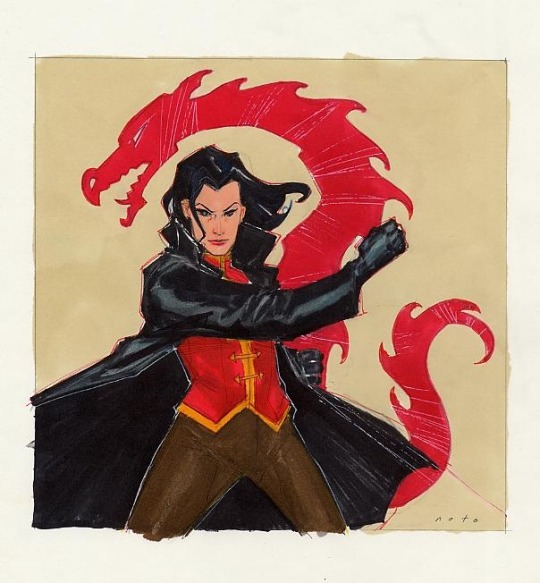
(art by Phil Noto)
So with her likely upcoming appearances in Young Justice and maybe Gotham and maybe Birds of Prey, I’ve had Lady Shiva on my mind again. Well... more than usual. And I managed to keep it bottled up so far but now I feel those urges again so let’s at least try to channel them into some hopefully decent comic book analysis. Today’s subject: why I can never get really behind any story that involves Lady Shiva teaching anyone martial arts.
Expect the usual copious amounts of NOT MUH under the jump:
The concept of Lady Shiva as a teacher comes from two main sources: Jim Starlin’s Death in the Family, which established her as a teacher for hire, and Chuck Dixon’s first Robin miniseries, where Tim Drake ran into her and asked her to train him. It was further solidified in Gulacy and Dixon’s Knightsend, where she helped Bruce get his kung fu mojo back after healing from his spine injury. And then there was Gail Simone’s Birds of Prey, where Shiva trained Dinah Lance to try and turn her into her successor. On top of all that, there’s New52 Shiva having trained Jason Todd, and while I have no idea if it’s been confirmed in canon, I’m like 90% sure she must’ve trained Damian at some point too. So it’s pretty much a solidly established fact that Shiva trains people.
And I personally find it to be a fundamental misunderstanding of her character.
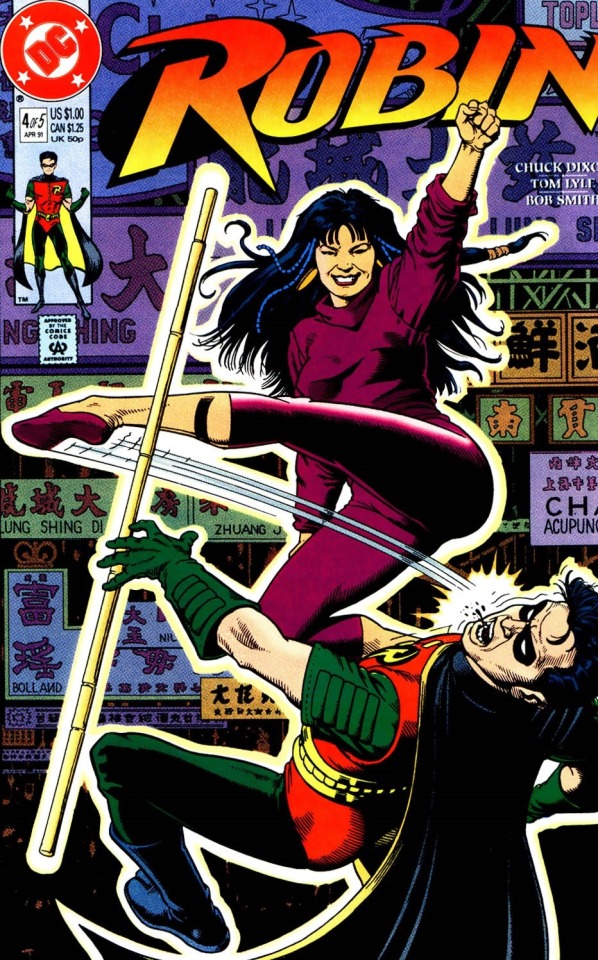
(art by Brian Bolland)
Now, first of all, logistics-wise I have a problem with people repeatedly going to train with a known killer when guys like Richard Dragon are just, y’know, there. And while there’s a dozen of possible in-universe explanations that you could possibly wield (It’s faster! It’s harder! It allows you to learn her techniques should you ever have to fight her!), ultimately I think the best explanation is just that it’s more dramatic. To be trained by someone diametrically opposed to your ideology in stuff you want to know but have vowed not to use is an absolute no-brainer in terms of dramatic tension. And that’s exactly why I don’t like it from the start: because every. Single. Story. That involves Shiva training anyone always ends in the exact same place: with Shiva ordering her student to kill and her student refusing to. Or in Bruce’s case, just pretending he killed someone.
This is nothing but a pointless exercise in character reaffirmation that does nobody any favors. Of course Batman/Robin/Black Canary is not going to kill anybody. Tempting them with it is just going through the motions. It was old hat in the 90s, let alone now. And yet, in one form or another, it just keeps happening. And it keeps happening because none of these stories are really concerned with Shiva herself. They are stories about Batman/Robin/Black Canary getting stronger, with Shiva used as a tool whose characterization is based on the most surface-level reading possible of her. The problem is that these stories also feed into each other, just like how Hush establishing Shiva as a member of the League of Shadows snowballed into this hellscape where she’s literally nothing but a member of the League of Shadows. Lack of interest in her actual character creates and perpetuates these misunderstandings until nothing else exists. But now the question becomes, well, what is her actual character? Good question.
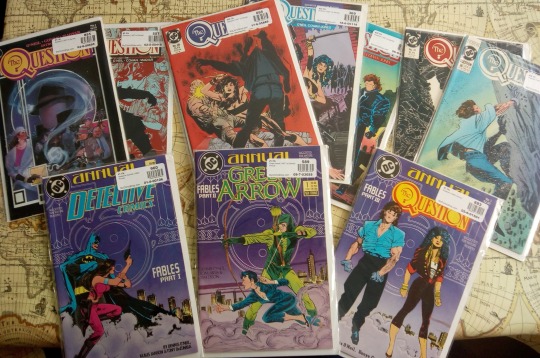
So in Denny O’Neil’s Question run, which I am never going to shut up about until everyone who even thinks about writing Lady Shiva reads through at least twice, Shiva physically and metaphorically kills Vic Sage, then saves his life. I’ve talked about this before but the short of it is that not only does she kill his body, but by presenting him with something he can’t understand, she also kills his stoic, narrow-minded idea of a black and white world. But once she’s saved him, she doesn’t stick around to train him. Instead, she gives him the address of the aforementioned Richard Dragon, who takes him in as a pupil. And this is where things start getting a bit floaty.
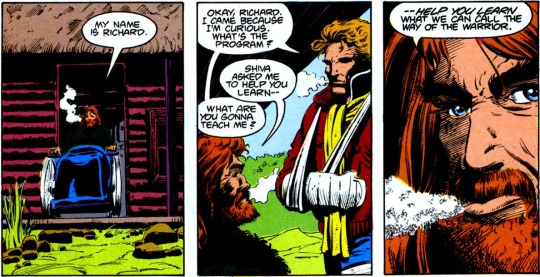
(art by Denys Cowan)
Because there’s a difference between teaching someone and helping them learn it on their own. Zen Buddhists know this. The idea is not to build a path for someone, or to guide them through it. The path is unique to every person and they have to walk it by themselves. But that doesn’t mean you can’t at least point them towards it. Which is what Richard does. Sure, he teaches Vic how to fight, but way later in the run, Richard explains how unimportant that is:
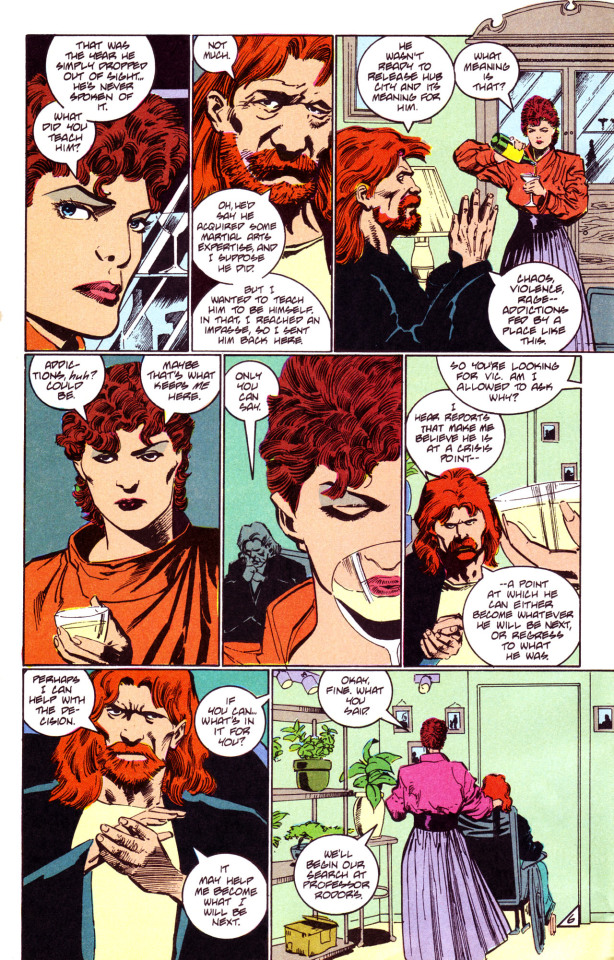
And make no mistake: Shiva is very similar to Richard in this aspect. Her interest in Vic is not about whether he can become a mighty warrior, but in what motivates him. She’s interested in seeing how Vic develops, and her reasons are, in her own veiled way, pretty much the same as Richard’s:
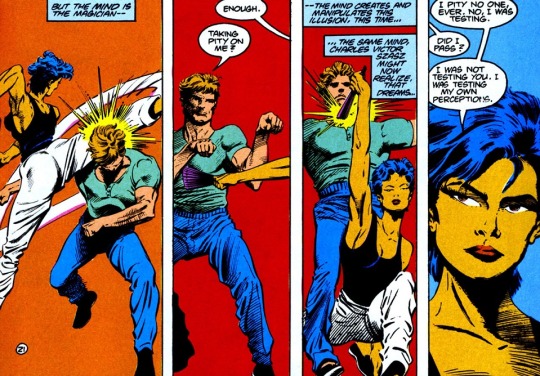
Right before this page, Richard explained that Shiva thinks Vic is fueled by a lust for combat, while he argues that it’s curiosity that motivates him. And the book never gives a clear-cut answer, showing Vic as an intensely curious creature (in fact, it was his curiosity about Shiva’s motivation that helped tear down his old black-and-white worldview) but also as someone prone to seeking the simplicity of punching dudes in the fucking face when the world gets too complex. Which is part of the genius of this Question run: nobody is ever that simple.
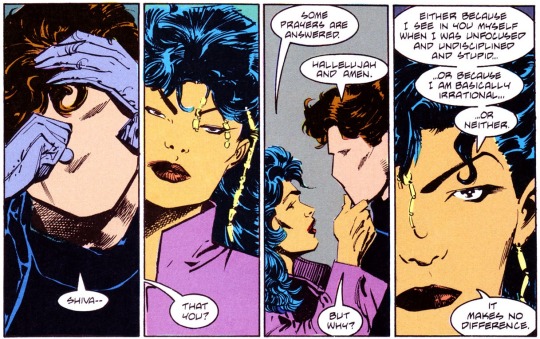
Now, it’s possible to transfer this to the exampled provided below and say that Shiva is similarly interested in Robin/Batman/Black Canary’s development. But only if you don’t really go any deeper than the pure surface. Because the difference here is that at no point through the entire Question run does Shiva demand that Vic take a life. She doesn’t want to prove to him that her way is superior, or that killing people makes you better. She doesn’t want Vic to become like her. She’s just interested in seeing how, once violently stripped of all his preconceived notions and brought back as an almost clean slate, he evolves. And it’s an evolution Shiva has respect for.
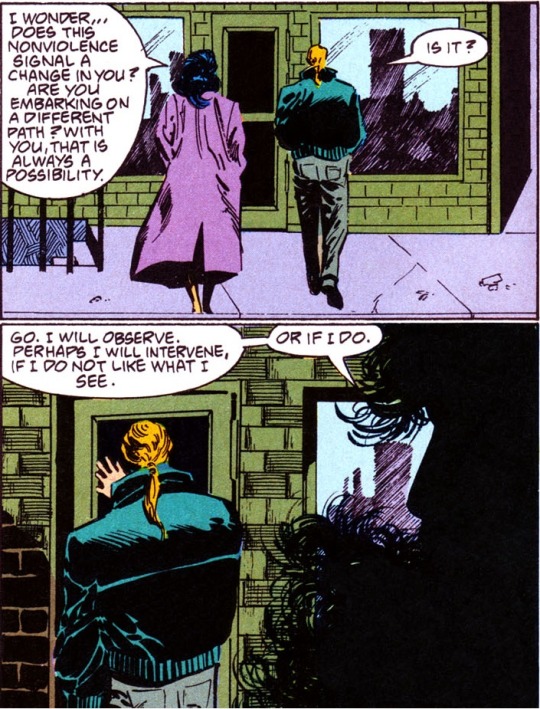
And that’s why I can’t get behind any story about Shiva as a teacher. Because just like Richard, she’s not there to try and tempt people to walk her same path of slaughter, sneering smugly at their heroic ideals of the sacredness of life. That’s a dangerously bi-dimensional reading of her that leads to endless rehashes of tired plotlines that go to the same wretchedly familiar places we’ve been to a thousand times before. There’s no deeper insight into the character of Tim Drake or Bruce Wayne to be gained by putting them in a situation where they’re forced to kill but they don’t. There’s no evolution, no characterization, there’s nothing to be gained except for a physical upgrade. And while they may not lose much from just going through the motions over and over again, Shiva gets it so much worse because her character is eroded by these nothing plots.
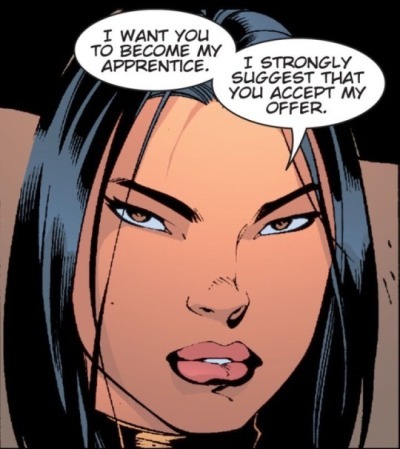
(art by Ed Benes)
In BoP, Simone tried to give Shiva a new reason to actively seek an apprentice, which at least demonstrates more agency on her part than the usual row of Bat-people knocking at her door. Simone’s Shiva is preoccupied with the future and creating a legacy, but again, that’s an idea I just can’t get behind at all. To have a character as steeped into Zen Buddhism and Taoism as Lady Shiva worry about life after death feels like a betrayal, and wanting to turn Dinah into a new version of herself clashes with everything explained above. And Starlin, Dixon, Gulacy, Loeb, Gabrych and Tynion IV don’t even try. It’s enough to make one wonder, is there any writer who actually paid attention when reading Question?
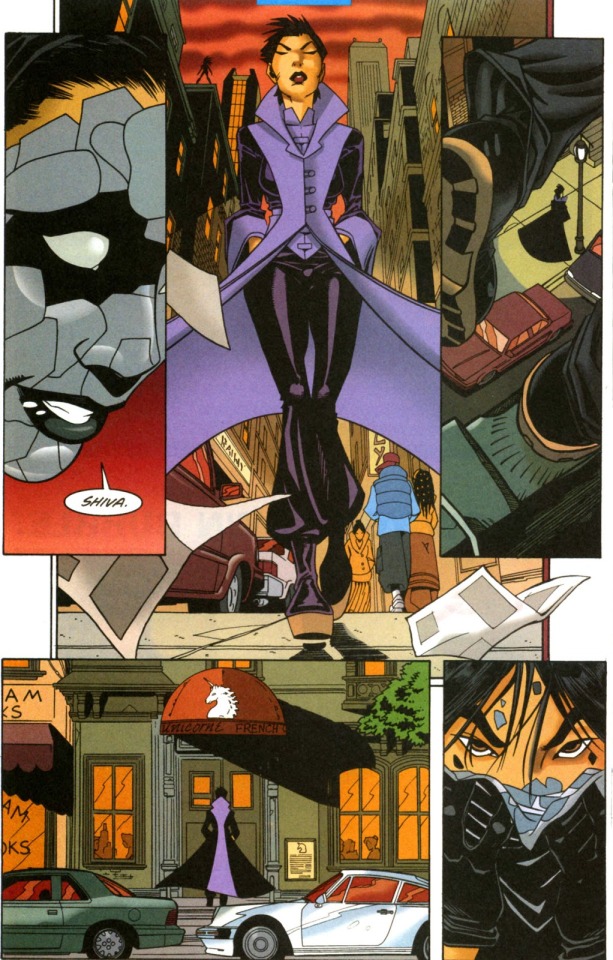
(art by Damion Scott)
Look, call this a reach, but I think there’s a pretty good reason why Lady Shiva’s first appearance in Kelley Puckett’s Batgirl has her wearing a purple coat that’s basically an update of her design in the very first issue of Question. And considering Puckett actually collaborated with O’Neil on the tail end of that run, it’s not even that far of a reach. More importantly, however, Shiva treats Cassandra pretty much the exact same way as she treats Vic: she tears her apart and then leaves her alone for a year so she can rebuild herself. That’s not to say it’s a 100% perfect callback. She does help Cass get her body-reading skills back, and sadly, some of Shiva’s kill-crazy personality has seeped in, making her give speeches about how Cassandra is a waste because she doesn’t kill and how if they are to fight they must fight to the death and whatnot. Which makes sense for Cassandra’s development since rejecting such notions is a big part of her character, although that doesn’t make it any less tired.
But ultimately, the reason why I bring up Puckett’s Shiva is because he’s pretty much the only one to actually take those aspects of O’Neil’s Shiva and bring them back into the light. In a perfect world, the whole “you must kill” thing wouldn’t exist and Shiva would just be satisfied with seeing Cassandra develop on her own. And as we move further into pure headcanon territory, I think O’Neil’s Shiva would be downright fascinated by the idea of someone becoming stronger than her in their own terms rather than just by trying to be like her in every way. Sadly, Puckett’s Shiva doesn’t stick the landing, since the respect she shows for Vic’s personal growth is nowhere to be seen here. And once Gabrych takes over, we’re right back into caricature mode, where we’ve stayed for over a decade save for that one Blackest Night Question special. Which was co-written by, big surprise here, Denny O’Neil.
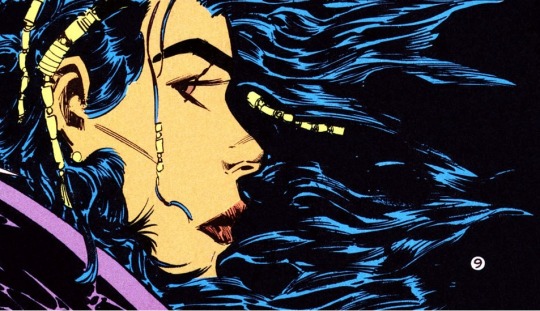
I understand why writers go for it. It’s simple, it’s dramatic, it’s familiar, and it gives their characters something to brag about. “Trained by the greatest martial artists in the DCU, including Lady Shiva” is used to describe even people like Cassandra who never actually trained under her. But I think it’s an error. And I find the alternative not just more gripping and compelling but also ripe with possibilities for both characters in the equation. It forces the person writing it to sit down and think what could Shiva find interesting in each character, and how they could be changed by her presence, framing it all as a two-sided journey of self discovery rather than a melodramatic ideological struggle of which we all know the ending. All you have to do is stop treating one of the most interesting characters in modern DC as a tool to make others get better at punching.
#Lady Shiva#DC#Batman#Robin#Batgirl#Denny O'Neil#Kelley Puckett#Comic books#Ramblings#First Shiva Rant of 2019#Look#I made it to two whole days#That's gotta count for something#Right?
68 notes
·
View notes
Text
I thought I’d share my thoughts on Fjord’s leadership, the group dynamic of the Mighty Nein and why it is that it’s only this latest episode that the entire group is starting to question Fjord’s ambitions. As always YMMV, and this isn’t fact checked it’s off my memory so if I quote a scene it might not be exactly how it went down.
It’s interesting relistening to C2 with Fjord’s arc in mind. In the beginning you get a lot of Fjord very carefully checking in with people and urging caution. You can see a certain amount of ambition, but not an unhealthy amount. He pulls it back when he realizes the group as a whole isn’t down with it. The first example would be some of the group wanting to keep low key about their exploits. Fjord I think is excited about the group’s accomplishments. He probably wouldn’t mind the M9 becoming well known, but he takes stock of where the group is at and reassures Caleb and Molly while pulling Jester back a bit about her own enthusiasm. He makes sure everyone agrees and are cool with: making a little reputation but keeping a low profile about it.
It’s sort of why he early on was the very clear leader. Things have changed now, but back then he was very solidly in charge of making the group work and interfacing with potential jobs. He also checked in with the M9 so the others looked to him for guidance in return.
(long post is long)
He was basically the only choice too at the time. Caleb and Nott were shifty and insular, Beau was crass, paranoid, and her curiosity was abrasive which set Caleb (and Molly to a certain extent although in a different way) on the defensive, Molly was shifty on purpose and liked to poke at things to see what experiences come out (and he had only experienced the Circus, he had never been any sort of leader), Jester was too chaotic to steer the ship, Yasha wasn’t there for long and was feared by a lot of members of the group at first. That left Fjord, who was the only stable/trustworthy/lest shady of all of them. He got a read the M9. Saw Caleb was skittish about groups and reassured him that the M9 wouldn’t make a huge splash (even when he obviously wanted them to make a name for themselves). Saw Jester needed stimulation so only reeled her in during situations the group needed to be low key, saw when Molly was lying about his past but didn’t pry about it immediately (and meanwhile Molly figured out Fjord wasn’t lying about his own confusion about his dreams and sword), Fjord saw Beau needed help interacting in a group and coached her. He very quickly became a rock for all of them and the group cohesiveness.
It starts shifting when Molly and Fjord devils tongued Nott into giving up her motives for stealing his letter and threatening Caleb.
Fjord wasn’t serious about hurting him. I think Travis says so in Talks and I completely believe it was an idle threat, but it woke Caleb up to how the power structure in the Nein was stacking up (It was reinforced later when Beau called him out about the Bowl). It made him a lot more cautious about how much trust he put in Fjord and about how he worked within the dynamic of the group. Caleb started to make himself more forthcoming so that when he needed to hide information away he wouldn’t be questioned about it.
Nott I don’t think ever really got over the Devil’s Tongue incident. I think she probably forgave Molly, but there was never any closure between her and Fjord and their relationship has been consistently antagonistic ever since. I think Fjord hasn’t forgotten the way Nott was completely willing to take away his chance of learning and bettering himself (moving against his ambition) without any sort of remorse on her end. Their arguments usually have a comedic spin so it wasn’t as noticeable earlier on. She sees him as a friend, but I don’t think she trusts him at all. She’s much more vocal about Caleb being the leader after that (even though she probably already thought of Caleb as the leader before).
Molly’s death is what spurred the big change in Fjord. Fjord blamed himself. He wasn’t there, he got captured. Molly was coming to save him and lost his life for it. His goals completely shift. He dumps his ideas about going to the Academy and decides to start actively searching out his past and answers about his powers. He urges the group to go towards the coast and they follow.
I’ve seen some people questioning why no one is doing anything about Fjord’s questionable behavior other than ribbing him about pushing buttons. I think there’s a few reasons. I think Fjord laid that bedrock of trustworthiness really well during the first half of the campaign.
Jester and Beau trust him, and I’ll note here that that’s really big for Beau. Beau is a questioner and she does question Fjord, but she trusts his answers. We don’t know what exactly went on between Jester and Fjord on the road, but we know that Jester knows a lot more about Fjord’s past than anyone else. And on a Talks Travis said had it been only him and Jester he would have told her the full details of his Ocean controlling dream right away. There was a big trust established between them before we even meet them. Jester’s feelings towards Fjord also complicate things because she is naturally a person that wants to see the good in people, so she would especially want to see the good in the person she has feelings for. Later on her own awareness and confusion on her own motives for how she sees Fjord distracts from what Fjord is actually doing in the moment a little bit (From her point of view). She knows he’s being different, but she’s not sure if he was always different or if she just put unfair standards on him.
Yasha isn’t around enough to express opinions, she goes with the group when she’s with the group. After Molly’s death (and with Ashley out of town ;A;) she gets very quiet.
Caduceus up until a few episodes ago was still an outsider. He was figuring out the group dynamic and trying to figure out where he fit, and he wouldn’t see Fjord’s behavior as odd having only just met Fjord after Molly’s death. Caduceus sees everything, but I don’t think he sees it as his place to interfere, at least not yet. I think from what we’ve seen Caduceus encourages people moving towards their destiny going off the conversations he’s had with Caleb and Yasha. I think he sees it as understandable that Fjord wants answers and he’s reserving judgement for what Fjord is going to do once he has that knowledge.
Nott does not (in my opinion ymmv) trust Fjord. She does have moments where she points out how dangerous his plan is, but it gets written off more as her own cowardice. She doesn’t push hard as long as Caleb doesn’t push hard. If Caleb is in then she’ll be in.
Caleb is funny. At first it was about keeping the group together, so although he prodded Fjord about his goals Caleb went with what the group wanted, and I think even after Fjord threatened him Caleb still trusted Fjord was all about the group’s safety. Caleb was worried about his place in the group when Fjord put his sword to him. He wasn’t worried about Fjord harming the group. That shifted as Fjord became more and more entwined with Avantika. He pushed more and more for Fjord to give his reasoning of what they’re doing and where they’re going and about Uka’toa (uka’toa), but because Avantika had them, everyone’s hands were tied. They couldn’t exactly run away from the pirate lady. Fjord telling him it was all to get away from her/thwart her plans seemed reasonable. Caleb I think was pessimistic about where ambitions would take Fjord (because of Caleb’s own past), but there was nothing he could really do at that point to stop him.
But now Fjord doesn’t have Avantika to blame when he wants to move forward with his ambitions. She showed him the potential of where he was going and he hasn’t stopped since, even after her death. Caleb meanwhile has become more and more conflicted about his own goals and his relationship with the rest of the group. Caleb is trying to backpeddle while Fjord moves forward carrying all of them with him and using up all that trust he gained in the first half of the campaign.
Fjord and Caleb caught each other at the worst possible times for each of them with that blood pact. Fjord, without Avantika to spur him on starts to give in to his own curiosities with no one to point the finger at when he gives into them. That’s not to say he was trying to hide behind her, but through her he was able to go forward without always looking back. She wasn’t going to stop for the group’s concerns so he was able to see and taste all the information he had been craving without having to take two steps forward and one step back. So with her gone, he wants to keep going forward with the same momentum. He keeps checking in with the group, but not in a meaningful way. It’s more of what are your concerns so that I can make sure you’ll keep going rather than: if you’re concerned then we probably should stop.
Caleb meanwhile badly wants to start focusing on his own goals (and put distance between himself and the group--Caleb I think by the way is starting to have these feelings after these very intense personal conversation where Fjord, Jester, and Caduceus in their own ways tell him how much they trust his instincts and then him killing a bunch of people with his wall of fire/fire ball combination, people they would have known personally after sailing with them. The Happy Fun Ball does not at all help with this later on).
With the blood pact Fjord saw that Caleb was willing to go along with his ambitions as long as he was willing to go along with Caleb’s later. Caleb wanted to focus on his own goals. He acted on instinct (which he felt repulsed by later) to get Fjord’s future loyalty and looked at Fjord as a tool rather than as a friend. After the pact he still prods Fjord, but he doesn’t escalate it. He carefully asks what Fjord wants to do making sure that it’s Fjord making the decisions. When he does question anything it’s only to mention that unleashing the giant snake is probably bad but not much else. He doesn’t suggest Fjord forget this quest all together.
Fjord meanwhile finally has someone to point at when he’s pushing towards his own ambition. In the newest episode it seems like he’s checking in with Caleb, but he’s doing it in front of the group. He’s pointing at Caleb and showing the rest of them that Caleb isn’t objecting to his plans. “If you look at what Caleb said.” “Caleb could tell you.” And that’s reassuring to the group, because everyone knows Caleb is the most cautious. The others are finally getting over that bedrock of trust laid out early on, especially with Jester’s frustrations at Fjord’s behavior. Being able to throw the ball to Caleb and show the others Caleb has no problem with things puts them more at ease even though alarms are slowly starting to go off.
Fjord makes things very reasonable. And it is reasonable. He wants to find out more about his powers. It’s only a day to the orb, it’s only two extra days to this potential temple he saw in a dream. Avantika was a mistep, but that was no one’s fault really.
Funny enough the Happy Fun Ball was innocuous. Fjord was just touching a random out of place spot on some glass. He had no idea how dangerous the room was, but for Jester I think it was the first time it really hit her how Fjord had stopped thinking about the group as a whole before moving forward, even though it could have been anyone and it was a complete accident. And it’s not that she resents him for putting her in danger. It’s that she’s worried about him. He disappeared. She had no idea where he went. His ambition is getting the group into trouble, but it’s very certainly putting Fjord in dangerous and compromising situations he might not be able to walk back from. When he was checking in with all of them it meant that she knew what he was thinking too. When he said they needed to be lowkey for Caleb and Molly she was on the same page as him. When he touches a random spot and doesn’t point it out to anyone else and suddenly disappears it drives home how she has no idea what’s going through his head. I think seeing the bloodpact too, seeing Fjord stab himself to fulfill his curiosity without giving any reason for it has shaken her.
anyway, long post long ymmv.
#fjord cr#fjord tough#character study#cr spoilers#critical role#mighty nein#m9#ymmv#meta#i probably should have gone more into beau but i'm sleepy#meta nein
74 notes
·
View notes
Text
The World Wants Greenland’s Minerals, But Greenlanders are Wary

This huge, remote and barely habited island is known for frozen landscapes, remote fjords and glaciers that heave giant sheets of ice into the sea.
But increasingly Greenland is known for something else: rare minerals. It’s all because of climate change and the world’s mad dash to accelerate the development of green technology.
As global warming melts the ice that covers 80% of the island, it has spurred demand for Greenland’s potentially abundant reserves of hard-to-find minerals with names like neodymium and dysprosium. These so-called rare earths, used in wind turbines, electric motors and many other electronic devices, are essential raw materials as the world tries to break its addiction to fossil fuels.
China has a near monopoly on these minerals. The realization that Greenland could be a rival supplier has set off a modern gold rush.
Global superpowers are jostling for influence. Billionaire investors are making big bets. Mining companies have staked claims throughout the island in a quest that also includes nickel, cobalt, titanium and, yes, gold.
But those expecting to exploit the island’s riches will have to contend with Mariane Paviasen and the predominantly Indigenous residents of the village of Narsaq.
Until she was elected to Greenland’s Parliament in April, Paviasen was manager of a heliport that provided one of the few ways to get to Narsaq, a village at the mouth of a fjord on the island’s southwest coast.
The forces reshaping the planet — extreme weather caused by rising temperatures, and rising demand for electric vehicles and other green technology that require bits of rare metals — converge at Narsaq, where fishing is the main industry and most people live in brightly colored wooden houses with tar paper roofs.
Because of climate change, the nearby fjord no longer freezes so solidly in winter that people could drive their cars on it.
But rocky heights above Narsaq, population about 1,700, also contain what may be some of the richest concentrations of rare minerals anywhere. The lodestone attracted an Australian company backed by Chinese investors that had hoped to blast an open-pit mine — until it ran into Paviasen.
The mine would bring jobs and tax revenue to the village, but it would also produce radioactive uranium. That alarmed Paviasen, who in 2013 formed a protest group she called “Urani? Namiik,” Greenlandic for “Uranium? No.”
“I was aware that this thing would affect us,” she said. “So I had to do something.”
Paviasen is a guarded person who speaks softly and chooses her words carefully, at least when speaking English, which is not her first language. But she also has a reputation in the region for implacability whose opposition to the mine has made her into a figure of some renown.
In April elections for Parliament, Paviasen and her protest group overcame a determined lobbying effort by the mining company, Greenland Minerals, and swayed public opinion in favor of a party that promised to stop the mine.
The victory for Paviasen and her alliance of sheep farmers, fishermen and other residents sent a signal to all those eyeing Greenland’s mineral wealth.
The lesson was that any project that threatened the environment or livelihoods was going to run into trouble from local people who were quite capable of standing up to powerful interests.
She is also aware that foreign money is still circling. “The mining companies know what we have in Narsaq,” she said with a frown. “We are not safe in the future.”


Greenland’s Moment
With 58,000 people in an area half the size of all of Europe, Greenland has been a mecca for prospectors since the 1800s because of its geological history. Because there are almost no trees and sparse vegetation, it is much easier for geologists to read the rocks and find likely places to dig for valuable ore.
Climate change has exposed more potential deposits. Pacific-bound ships carrying ore can now sail across the top of Canada much of the year, shortening the trip to processing plants in Asia.
Reflecting Greenland’s newfound stature, the United States has recently stepped up its diplomatic presence. Antony Blinken visited Greenland in May, four months after being named President Joe Biden’s secretary of state, meeting with members of the newly elected Greenland government. Last year, the United States opened a consulate in Nuuk, the capital, for the first time since the 1950s. A delegation of U.S. officials visited Greenland last month and pledged aid to improve trade, education and the mining industry.
Anglo American, a British mining giant, has staked out swaths of an island believed to have lucrative deposits of nickel, essential for most electric car batteries. In August, KoBold Metals, a California company backed by Bill Gates and Jeff Bezos, formed a joint venture with Bluejay Mining, a British company, to search for minerals in Greenland using artificial intelligence to pinpoint deposits from mountains of data.
At the moment, only two mines in Greenland are active, one producing rubies and the other anorthosite, used in paints, plastic coatings and special varieties of glass. But dozens of companies have exploration projects underway, and five have licenses to begin digging.
Leaders of the new government in Greenland see the country’s ore as a means to work toward financial independence from Denmark. Greenland has a parliament that oversees domestic affairs, but Denmark determines foreign policy and subsidizes the Greenland budget with 3.9 billion Danish kroner per year, or about $620 million.
No one believes that Greenland’s reserves are big enough to make it the Saudi Arabia of nickel or titanium. Denmark would take a big share of any mining royalties.
A Promise of Riches
On a crisp, sunny Saturday morning recently, men drifted down to a dock in Narsaq lined with small boats. Some carried rifles on their shoulders and, in one case, a well-used harpoon. Some were on their way to hunt seals while another group planned to look for minke whales.
Other men — they were all men — simply watched and gossiped from mismatched chairs in front of a storage shed. Opposition to the mine appeared to be unanimous.
“My children and grandchildren would also like to live in this town,” said Emanuel Joelsen, one of the whale hunters. Whale meat is still a big part of Greenlanders’ diet, and they are allowed under international agreements to hunt a limited number of animals.
Like almost all settlements in Greenland, Narsaq can be reached only by sea or air. Most people speak Greenlandic, the Indigenous language that is related to Inuit languages spoken in Canada and Alaska. The main employers are the government and a small factory that cleans and freezes halibut, salmon and shrimp caught by local people for export to Asia.
Narsaq residents were initially in favor of the nearby mine, attracted by the promise of badly needed jobs. “They said people in Narsaq would be rich because of the mine,” said Niels Sakeriassen, who manages the fish processing plant.
But opinion shifted as people learned more about the project. Tailings from the open-pit mine would be deposited in a lake that lies above the town. Narsaq residents distrusted assurances by Greenland Minerals that a dam would keep radioactive water from reaching their homes.
Mining ‘the Right Way’
Mining executives say they are aware of the need to pay attention to climate concerns. In August, rain fell for the first time at a research station at the high point of Greenland’s ice sheet. It was a topic of discussion wherever Greenlanders gathered.
Some mining companies see a chance to establish Greenland as a reputable source of the raw materials for emissions-free power generation and transportation.
“You can do it the right way,” said Bo Moller Stensgaard, a former Danish government geologist who is the CEO of Bluejay Mining.
He pointed to Bluejay’s plans to begin mining ilmenite, an ore that contains titanium, from a site hundreds of miles north of Narsaq. The ilmenite can be separated from the black sand that contains it using magnets rather than toxic chemicals, Stensgaard said, and the sand will be restored after mining is complete.
An Alternative to China
On the opposite side of the fjord from Narsaq is a mining project whose main backer has not generated the same hostility as Greenland Minerals. Greg Barnes, a veteran prospector from Australia, has a license to mine the area, known as Tanbreez. The site has only trace amounts of radioactivity, Barnes said from Australia, but rich deposits of metals like tantalum, used in mobile phones, and zirconium, used in fuel cells and various kinds of electronics.
Barnes may have unwittingly played a role in prompting Donald Trump to float the idea of buying Greenland while he was president. Word that Trump wanted to acquire the island from Denmark emerged soon after Barnes visited the White House in 2019 to brief officials on Greenland’s potential.
While denying that he planted the idea in Trump’s head, Barnes said U.S. officials “see us as a solution” to China’s dominance of rare earths.
So far Paviasen and her group have focused on stopping the Greenland Minerals project. But they are watching Barnes’ plans warily.
‘A Lot of Money for Local People’
Greenland Minerals has kept a low profile since the April elections brought an anti-uranium government to power, but it has not given up on mining near Narsaq. The company is looking for ways to address local concerns, for example by shipping the minerals somewhere else for processing rather than separating out uranium in Narsaq.
Greenland Minerals promised to train local people to work at the mine and to buy from local suppliers whenever possible. It also commissioned studies showing that radioactivity from the mine would be negligible and that there would be minimal impact on the environment.
The project would “bring many benefits to Narsaq and southern Greenland,” John Mair, the managing director of Greenland Minerals, said in an email. “It would be a significant economic stimulus for local businesses.”
Greenland Minerals’ largest shareholder, with a 9.4% stake, is Shenghe Resources, which has close ties to the Chinese government. Mair denied media reports that Greenland Minerals is a stalking horse for Chinese interests, saying Shenghe plays a crucial advisory role. “There are no Western world groups that can match Shenghe’s proficiency and expertise” in rare minerals, Mair said.
Some local people support the mining project, though they tend to be less visible. “It’s about jobs, work, a lot of money for the local people,” said Jens Karl Petersen, a cook in Narsarsuaq, a former U.S. air base about 30 miles from Narsaq.
A League of Sheep Farmers

Aviaja Lennert with her sheep on her farm near Narsaq, Greenland, Aug. 22, 2021. Greenland has rare elements needed for electric cars and wind turbines. But protesters are blocking one project, signaling that mining companies must tread carefully. Carsten Snejbjerg/The New York Times
On a sunny day in August, Aviaja Lennert, who raises sheep on a farm farther inland from Narsaq, steered her battered four-wheel-drive station wagon up a precarious gravel road to the crest of a high ridge and braked to a stop. Below, icebergs slowly drifted in the blue-green water of the fjord. The only sound was the wind and the occasional “baa” of a sheep grazing on the steep, rocky slopes.
Lennert, who also works as a schoolteacher and rents a small house on her farm to tourists, walked briskly up a nearby rise and pointed at a slab of dark gray mountain above.
“That’s where the mine will be,” she said.
Her sheep, raised for their meat, graze at the foot of the mountain. “I’m worried about my family,” said Lennert, who is married and has three children. “I’m worried about my sheep.”
Lennert and other farmers in the area, one of the few places in Greenland warm enough for agriculture, are among the most fervent supporters of Paviasen’s protest group. They are afraid that people would stop buying their meat, believing it tainted. The organization’s symbol, a smiling orange sun, is painted on the side of Lennert’s barn.
Sheep farming in Greenland is not an easy life. The roads are so rough that some farmers’ children sleep during the week at their elementary school in a nearby village. A daily commute would be too arduous, even though their homes may be only 10 miles away.
In the spring when the lambs come, the farmers sleep for weeks in their barns to deal with difficult births. The rewards of such a life are impossible to put a price on.
“This is one of the most beautiful places in Greenland,” Paviasen said. “It’s worth fighting for.”
“We will stop the mine.”
— This article originally appeared in The New York Times.
— Jack Ewing | October 2, 2021 | Ekathimerini.Com
0 notes
Text
CHAPTER 27 - Team 2
Uchiha Sasuke was officially assigned as Jounin Teacher for genin Team 2.
He didn’t miss the irony.
His team was made up of a relatively high-scoring kunoichi named Miyamoto Ayaka, an underachieving boy named Kawaguchi Hiroto, and a disturbingly quiet kid by the name of Mori Yori, which was a terrible name and Sasuke hoped his parents felt ashamed of themselves. Thanks to Naruto’s genin-training bet (why did kages think that was something to bet on?), Team 2 was stuck waiting around for their official teacher assignment (which was Uchiha Sasuke) an extra two weeks, which Sasuke had spent making Hyuuga Himawari.
And this time, this time, Sasuke was going to get this teacher thing right. He was prepared this time, rather than beheading his way into getting an obsessive surprise trio of genin. He knew how things were supposed to go, he’d planned, and he still wasn’t allowed on school grounds so his team was officially called to meet at Training Ground #5 at sunrise.
They showed up right on time, as a group.
Ayaka, leading the trio up the path, took one look at Sasuke and said, “We wait all this time and get a guy with one arm?”
“Hit the bottom of the barrel, I suppose,” Hiroto said with a shrug, not terribly upset, and then ran back a ways to drag the third member of their group up towards Sasuke – Yori was slouching his way along, yawning and halfheartedly batting at Hiroto’s hand as he was towed forward. In the meantime, Hiroto frowned at Sasuke. “Do you have any kind of…I don’t know, credentials?”
“Credentials,” Sasuke repeated, deadpan.
Hiroto nodded. “Yeah. We’ve been getting along just fine without a teacher so far, I mean, with training and everything while we waited around for…you.”
Yori yawned, shoving Hiroto away, and mumbled, “That’s Uchiha Sasuke.”
“The next Hokage’s traitor boyfriend?” Ayaka asked, looking Sasuke up and down again. It was interesting that that was his reputation. Then again, there were worse ways he could go down in history. Her opinion didn’t appear to have changed much. “Really?”
“Really,” Sasuke confirmed, and considered his options – the intended bell test obviously wouldn’t work, since they were already ganging up on him together, so what else could he do? All of his pseudo-lesson plans were out the window. “So. You don’t think you need a teacher?”
“We’re doing fine,” Ayaka said firmly, and crossed her arms over her chest, giving Sasuke what was probably supposed to be a cold hard stare but mostly looked like a child’s frowny face. “Why did it take you so long to get here?”
Sasuke shrugged, and leaned against a nearby tree. “If you don’t need me, why does it matter?”
“We haven’t been on any missions, is why,” Ayaka said. “We’re supposed to be active duty shinobi, but we haven’t had a single mission or order until now! And it’s to meet you! We’re genin now! That’s not right!”
Considering his options, Sasuke thought for a moment. “That’s because your jounin teacher is also there to ensure that if anyone attacks you, you’ll have protection,” he said.
Sasuke decided to make a bad decision.
Teamwork wasn’t an issue, and he was more than happy to encourage Team 2 to not get attached to him, particularly after last time. That didn’t even start on how what Sasuke usually thought were good decisions ended up making everything worse. Yes, this was the way he’d go with Team 2.
So, Sasuke sat down. “And if you think you don’t need me, protecting you on missions is all I’ll do. If you want help, I’ll help. If you want training, I’ll train you. But you seem connected and independent enough that just standing by and watching your backs on missions works fine for me.”
“Well.” Ayaka faltered for a moment, and then glanced back at the boys, returning her eyes to Sasuke’s half-visible face with that same attempt at a ferocious expression. “Well good! That’s all we need!”
“This is probably a trap,” Yori said.
“Why would I bother trapping you?” Sasuke asked.
Yori slumped even more, and nodded, shuffling towards Ayaka with a hand outstretched. Hiroto was a quick couple of steps behind, also with an outstretched hand, each of which received a kunai out of Ayaka’s side holster that had a long ribbon attached to the hilt. They then proceeded to go swinging the things around like some kind of morning star. It was almost painful to sit there and keep his mouth shut, but he’d made his terrible decision and the last thing he wanted to do was break any sort of promise or agreement within 24 hours of meeting Team 2.
So, he thought about how he got his kids to do things (or, specifically, eat things), and stood up. He’d barely made it a few paces away from his previous seat before Hiroto called out, “Where are you going?”
“I’m just going for a quick walk for training, you’re not really ready for it,” Sasuke said, which was true, and kept on walking.
“What do you mean, not ready for it yet?” Ayaka demanded.
Sasuke shrugged. “I mean you’re not equipped for my level of training yet. Remember? That’s the whole point of me being here.”
“You’ve got one arm, it can’t be that hard,” Ayaka said.
At that comment, Sasuke turned back around, eyebrows rising. “You think having one arm makes me weak?”
Ayaka backpedaled a little bit, like any child confronted with the fact they’d said something wrong. “I wasn’t – I mean, you have to be! You can’t do hand seals with one arm, can you?”
Sasuke raised his hand, wordlessly going through a few quick seals until, at the very last one, a cage of lightning burst out of a nearby tree, igniting the leaves and scorching the bark with one great flash and a roar of power.
Team 2 stared at the huge and very destroyed in a millisecond tree.
“Hand seals aren’t what create chakra, they’re simply an easier and more concrete method to channel power,” Sasuke said, and dropped his hand. “Losing the other hand did make me slower, yes. But it also made me realize you don’t even need hand seals if you know a jutsu well enough.” He couldn’t help the smirk that came across his lips. “And my hand seals were fast enough that slower still means better than your average jounin. Next objection to having a one-armed teacher?”
Yet again exhibiting teamwork, Hiroto stepped forward to stand with Ayaka, even when she was wrong. “Well I object to your hair, it looks stupid,” Hiroto said. “How can you even see?”
“I can see with a weird-looking eye that’s behind the stupid hair so people don’t get scared or stare at me,” Sasuke said, nice and blunt, and brushed the hair back so Team 2 could see the rinnegan eye in all its glory.
“What happened to you?” Yori asked. He stared hard enough for all three of them.
“A shinobi’s life isn’t always fun,” Sasuke decided was an adequate answer, delivered dryly and accompanied by letting his hair drop back in front of the eye as he turned towards Yori. “It’s your turn to find a reason I’m not worthy.”
Yori looked like he was about to shrink into the ground, but instead he clenched his hands into fists and said, “Because you’re a traitor.”
Sasuke found himself nodding in approval. “If you’re going to question someone’s ability, or wonder about anything when it comes to humanity, don’t think about what you see. Look underneath. And you’re right, I was a traitor. But you already said it, I’m the future Hokage’s ex-traitor boyfriend. I have fought for Naruto and Konoha, and I will continue to fight for them, without hesitation. I betrayed Konoha for a very specific reason. I did everything for one specific reason, one that’s gone now. I’m loyal, and those I am loyal to have told me this is my job, so I’m not going anywhere. My traitorous past has nothing to do with my ability to serve as your jounin teacher.”
“What was the specific reason?” Ayaka asked.
Sasuke didn’t really want to get into it, but this was about establishing trust, he supposed, so he sighed, and answered, “Vengeance. I was obsessed with killing the man who murdered my family. By the time I was 17, he was dead and I’d ruined my life by becoming a missing-nin. I came back to Konoha, and that leads us to now, when I’m going to go for a walk.”
He turned and started walking before they could start asking questions again, Team 2 trailing tight behind him, right up until the moment he walked up a tree.
Ayaka immediately asked, “Did you learn to do that because you can’t climb normally with one arm-”
Sasuke dropped back down, right in front of her, and gave her a hard look. “Ayaka, the only thing I can’t do is clap. If you keep thinking I can’t do things because I have one arm, I’m going to tie yours behind your back for a week. Do you understand?”
With wide eyes, Ayaka nodded quickly. “Yes, sir.”
“One of the reasons that I can do everything but clap is precise chakra control. That’s how I’m going to go walking around Konoha’s walls – I concentrate my chakra in my feet, think about sticking, and move forward,” Sasuke said, and stood back up. “None of you know how to do that yet, so you’re welcome to try and keep up with me on the ground, but-”
“We can figure it out,” Ayaka said, hands planted hard on her hips. “Go get your exercise, old man!”
Being 28 years old did not qualify him to be an old man in any corner of the world, but Sasuke ignored it and went off to do his wall-walking laps as promised. It ended up more like interval training, after Team 2 followed to the wall. Sasuke would stroll along the high white stonework, casually offering Team 2 helpful suggestions until he was out of sight, and then he ran the other 85% of the wall until he was back to strolling that same 15%. Both portions of the circuit took about the same amount of time.
When lunchtime rolled around, Sasuke’s team was already at least capable of solidly sticking to the wall for a few minutes, even if they fell off after a couple steps. Overall, it was a sign that maybe, possibly, Sasuke’s decision wasn’t too terrible.
6 notes
·
View notes
Text
Epic Movie (Re)Watch #171 - X-Men: First Class
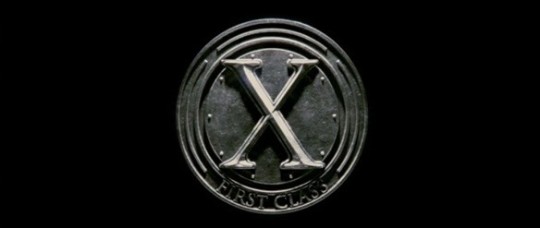
Spoilers Below
Have I seen it before: Yes
Did I like it then: Yes.
Do I remember it: Yes.
Did I see it in theaters: Yes.
Was it a movie I saw since August 22nd, 2009: Yes. #104
Format: Blu-ray
1) Poland, 1944
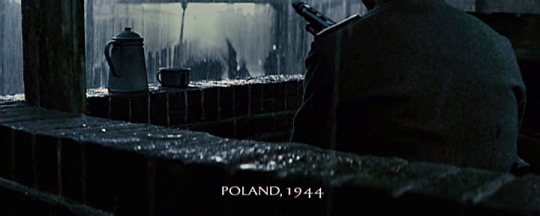
This film hemmed so close to the opening scene of the original X-Men film that producer Bryan Singer thought he was actually looking at the old footage. It is a smart and effective opening to the prequel, as it not only re-establishes a character who has been absent from the series for five years but also sets up his key conflict with the film. Erik is still dealing with the pain from this event in a much more key way than he is during Ian McKellen’s tenure; what he went through in the concentration camp is the driving motivation behind his actions in the film. Making this first scene all the better.
2) Young Charles & Raven.
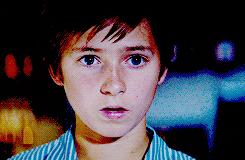
Raven [upon first meeting Charles]: “You’re not scared of me?”
The adoptive brother/sister relationship between Charles and Raven might be totally invented for this film (as in: has no source in comic book canon which I am aware of) but I freaking love it. I’m a sucker for platonic male/female relationships and the connection these two have is in a lot of ways the beating heart of this film. Which makes it all the more tragic that they drift apart in the future (something I’m hoping will be remedied in X-Men: Dark Phoenix). The key to their relationship is that they feel safe around each other. This is the first time that either of them has realized they’re not truly alone in the world. That someone hasn’t pushed Raven away for her natural form and that Charles realizes his ability to read minds does not make him a freak. There’s a sense of ease, comfort, and community they have with each other that was totally foreign to them up until that moment. A strong foundation to a strong relationship.
3) Kevin Bacon as Sebastian Shaw.
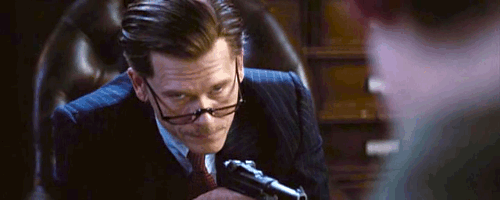
Bacon’s Shaw was all but glossed over in most promotional materials, making his presence in the film a pleasant surprise for first time viewers. And pleasant it is because Shaw is an absolutely wonderful villain. Bacon brings a refreshing and engaging amount of charisma/fun to the part. He’s the bad guy you love to hate with a little bit of Bond villain in him. The first thing he does when we meet him in murder Erik’s mother in front of her 12ish year old son. And then he reacts with unadulterated GLEE when that murder allows Erik to tap into his mutant powers. He’s downright giddy! In a series filled with classic bad guys like Magneto and William Stryker, Shaw is able to hold up with the best of them.
Shaw [after murdering Erik’s mom]: “We’re going to have a lot of fun together.”
4) James McAvoy as Charles Xavier.
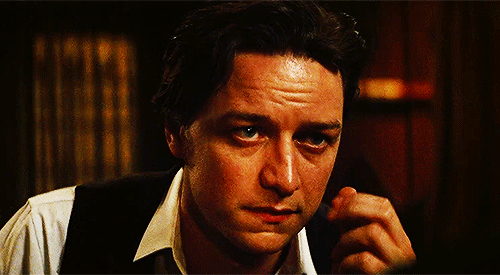
McAvoy’s Xavier is delightfully more flawed than Stewart’s. He is much more of a cad. He is more arrogant, a bit more green, a bit more cocky, and a lot more naive. BUT he’s not just that. He’s not some douche bag who learns to be a great man. You see the greatness in him still. He is still Charles Xavier after all. When things get serious, he gets serious. He lets Moira know how important this is to him, he has hope for the future of his people and he is able to put away the womanizer we meet early on when it comes to helping people. There’s still that naivety a little but, the belief that everything will be alright after they save the world. That fear will just stop. But it’s mixed in with Xavier’s trademark hope. McAvoy is great as the character and a joy to watch.
5) Jennifer Lawrence as Raven/Mystique.
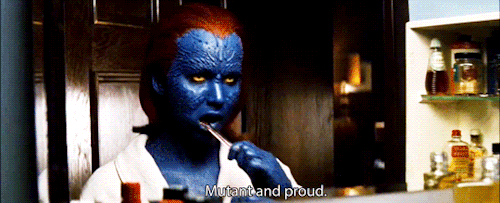
Raven is in a much different place than Rebecca Romijn’s Mystique was in the original X-Men trilogy and it’s a lot of fun to watch. There is this humor and warmth to the character that we don’t often get to see. A smile, a playfulness with Charles, but we see her develop into the more jaded warrior of Magneto’s crew. Watching that transformation is great and heartbreaking, especially as it shakes up her relationship with adopted brother Xavier. And Lawrence is great in the part. A pre Hunger Games role, I think it’s one of my favorites that she has under her belt. Many of her characters are so serious and dower these days when the actress has a wonderful heart/sense of humor she gets to show off her. It’s lost in the future installments, but that makes sense considering the path the character goes down. It’s a tragedy, but one that’s good to watch.
6) Oh Charles...
Raven: “Would you date me?”
Charles: “Of course I would. Any man would be lucky to have you, you are stunning.”
Raven: “Looking like this?”
[Charles stutters for a second then looks at Raven.]
Charles: “Blue? [Beat.] You’re my oldest friend...I’m incapable of thinking of you that way. I feel responsible for you.”
He changes from, “oh absolutely,” to, “I could never think of you like that,” REALLY fast when he realizes she’s talking about her natural form. And that’s where his naivety comes into play. He doesn’t understand what it’s like hiding who you really are in such a basic and obvious way. Not telling someone you can read their minds is fundamentally harder than having to wear a skin that isn’t your’s because you think people will reject your natural form. And that’s the key to her conflict in this film. Being mutant and proud.
7) McAvoy and Lawrence have such a wonderful natural chemistry as adopted brother & sister, must obvious in the scene above when Raven asks Charles if he’d date her. Her snuggling up to her brother while he reads her his thesis makes my heart melt.
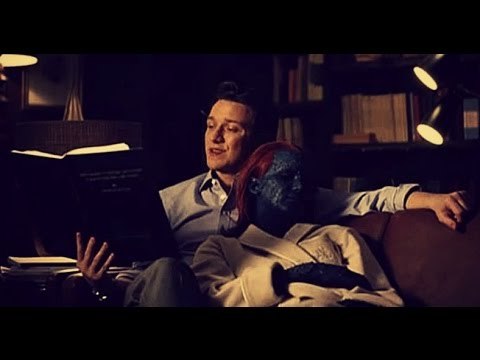
8) Michael Fassbender as Erik/Magneto.
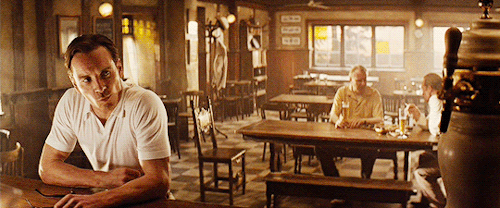
Honestly the casting of Erik & Charles could have been royally screwed up. This film does it perfectly. Fassbender brings a single determination and focus to his character. He is ruthless, brutal, violent, intimidating, but you still sympathize with him. Hell, you are ROOTING for him. In a lot of ways he’s even more sympathetic than Charles is. Fassbender is able to play the pain Erik has been though with much more relevance than McKellen ever got the chance to because the story allows it. He is in anger mode, with a bit of self loathing (he is what he is because a man murdered his mother, in his mind) but more with a taste for vengeance. Fassbender is absolutely beautiful in the part and I wouldn’t ask for a different actor to play him.
9) Of course within one minute of meeting Rose Byrne’s character she is strips into her underwear because, hey, sexy women get objectified in film!
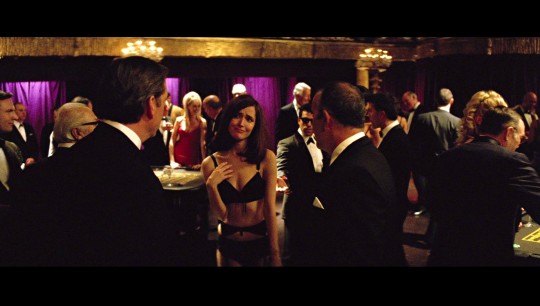
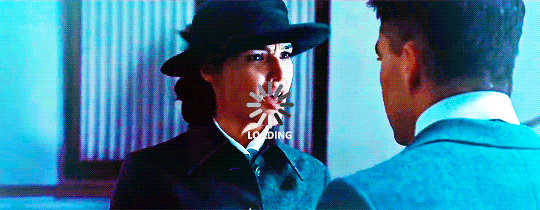
(GIF originally posted by @chirrutimwae)
Yes, I understand that the Hellfire club is like a sexy lingerie strip club thing. Yes I understand that Moira is a determined CIA agent who will do her job no matter what. And yes this is the only time Moira does this and she’s actually a pretty great character. But you know what? The Hellfire club did not NEED to be a sexy lingerie strip club. It could’ve been some elegant hoity-toity how do you do thing. And Moira didn’t need to strip down to her lingerie at all in the film. It was not needed. It does not tell us anything about her character or the story.
Ugh, living in a post Wonder Woman world is going to be a lot harder than I thought. I mean, I wasn’t exactly blind before. But I definitely needed glasses to see through the haze which is the male gaze and now I do with Wonder Woman. And now it’s just...oh boy.
10) Rose Byrne as Moira is a solidly written character that the actress plays well. The filmmakers don’t spend much time focusing on the, “Moira in her underwear,” stuff and she turns into pretty much the best government agent in the film. She is intelligent, more focused on the job than any of her coworkers (who are dogged down by fear, bigotry, and male ego), and she forms this nice relationship with Charles which yes ends up romantic but is also more based on mutual respect. I love couples with mutual respect for each other. Rose Byrne plays the part wonderfully. I love the actress now BECAUSE I was introduced to her in this film. She is capable, strong, but not pigheaded or egotistical. She’s good at her job and she knows it so she continues to be good at her job.
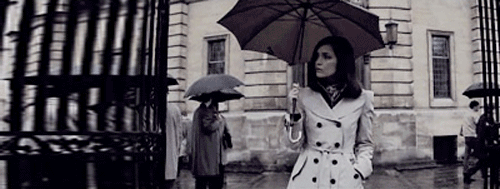
11) January Jones as Emma Frost.
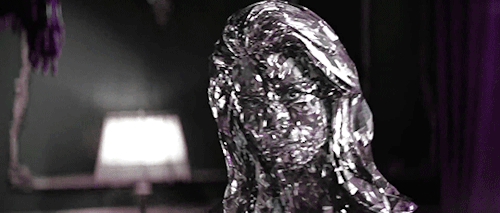
So I know there is a lot of hate out there for January Jones as Frost, but I don’t really mind her. But I’m not going to like strongly defend her either. I put more blame on the writing than her as she works with what she is given. Emma Frost is this badass in the comics who - yes - dresses in a VERY sexual manor (because she likes to, I believe) but she is also wonderfully complex. She usually has an intense rivalry with Jean Grey, is often romantically linked to Scott Summers, is an extremely powerful telepath, reformed bad guy who is often not so reformed, and over all fascinating read. But the filmmakers sorta just latched onto the, “sexy female bad guy with diamond skin and telepathic powers.” Which would’ve been fine is Emma had been developed a bit more but she never really goes beyond that/Shaw’s hench woman.
And again, the power of Wonder Woman has me asking: why is she dressing so sexually? I mean if there’s like a legitimate reason, like the character is more comfortable with that or confident in her body, than go for it! But a reason is never given she just does that and it seems to be for the sake of the male gaze. Which is disappointing to say the least.
12) The scene which I (and Henry Jackman’s score) refers to as Frankenstein’s Monster.
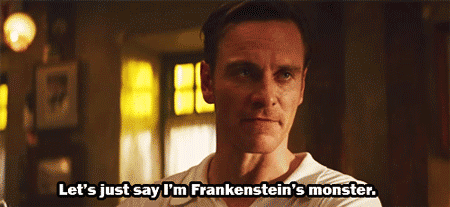
This is Erik at his most brutal. He finds those two “former” Nazis (can you ever really be a former Nazi if you’re not repenting for your sins?) in a bar and engages in conversation with them. It’s incredible tense in the most wonderful sense, because Erik is enjoying screwing with these Nazis. And then he cuts them down in the most brutal and badass way possible in a wonderful (and wonderfully simple) moment of action supported by Henry Jackman’s incredible score. I am very much enjoying any and all forms of media where Nazis are absolutely wrecked so this has is even more enjoyable now than it was in 2011.
13) The blonde Charles with looked familiar to me...
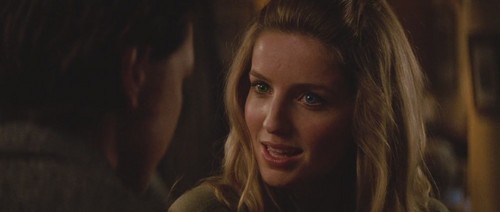
Then I realized she’s Annabelle Wallis, who is in The Mummy with Tom Cruise.
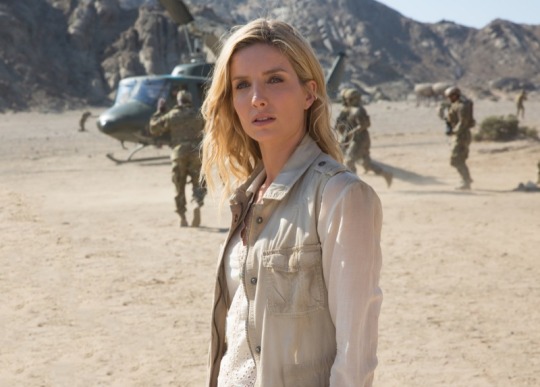
As of writing I have yet to see the new Mummy film so I don’t like or dislike this actress. Just noticed it.
14) When I first saw this it took a second to sink in.
Charles [to the CIA agent who accused him of doing a magic trick]: “No agent Stryker. Although I could tell you about your son William...”
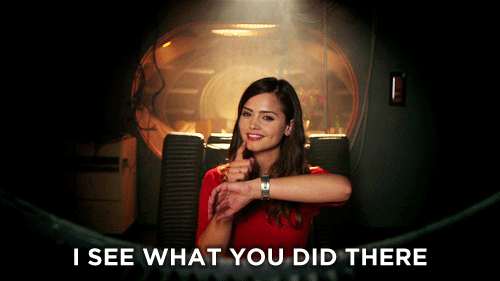
15) Oliver Platt as the Man in Black.
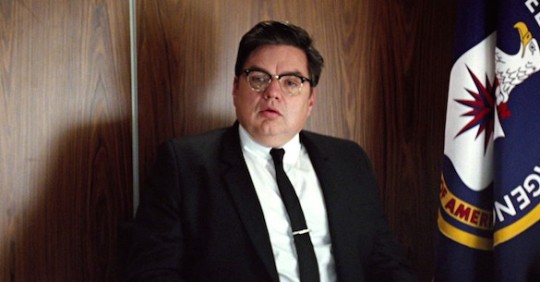
I enjoy Platt’s performance in this film. He’s not your typical government stooge to keep the heroes in line. He’s like a kid at Christmas. All these years he thought the impossible wasn’t so impossible and now he has proof. And he’s super excited about that and helpful because of it. He’s just a wonderful addition to the film.
16) According to IMDb:
A telepathic battle between Professor X and Emma Frost was going to be in the film, but upon the release of Inception (2010) the concept was scrapped. This was then used in X-Men: Apocalypse (2016), between Professor X and Apocalypse.
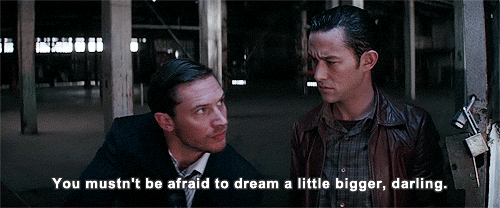
17) So let’s consider Charles and Erik’s first encounter, shall we:
Charles jumps in to save the life of a man he doesn’t know.
Charles helps Erik to calm down and find peace because he doesn’t like him to be upset.
And of course, this:
Erik: “I thought I was alone!”
Charles: “You’re not alone, Erik. You’re not alone.”

Yes this is a strong first interaction between what will be the bromantic frenemy relationship of the century, but more so than that it plays into some strong conscious gay subtext feature in the film. Like in X2 when Bobby came out to his family as a mutant, there are small but important lines between being a mutant and being gay. Two lines stand out in particular: the one above and then...
Hank [when he’s outed as a mutant]: “You didn’t ask so I didn’t tell.”
X-Men have traditional been used as a parable for those fighting for their rights in those world (specifically America). When they were first being published there was a strong line between Professor X & Martin Luther King Jr. as well as Magneto & Malcolm X. But as times have evolved, so have the X-Men. With a number of LGBTQIA actors and characters in the franchise, in the 21st century X-Men has at times strongly paralleled the issues gay people face in this world. Particularly through Hank’s, “don’t ask don’t tell,” line and Erik’s, “I thought I was alone.” Gay visibility was not as much of a thing in the 50s as it is in 2017, and it was in the 60s when things like the Stonewall Riots occurred giving gay people much more visibility. This film is set in the 60s.
18) Nicholas Hoult as Hank McCoy/Beast.
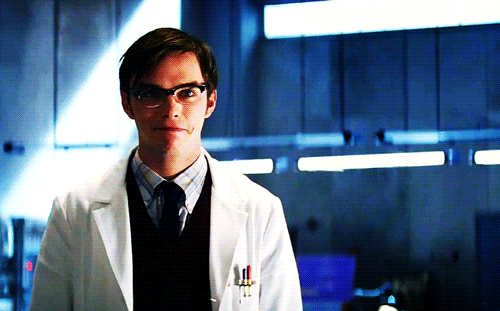
Hoult brings a lot of heart to the character originated brilliantly by Kelsey Grammer in The Last Stand (Hoult even watched early episodes of “Frasier” to see if he couldn’t emulate Grammer in any way). He features the same intellect as Grammers’ Beast but is a lot more soft spoken. He has not made peace with the animal side of himself yet or who he really is. Like Raven, he needs to learn to take pride in his status as a mutant. He just gets there in a different way than she does. This was the first film I saw with Hoult and I have to say I’m glad for it. Because I think he’s a talented actor who was able to make the role of Hank McCoy remarkably memorable.
19) There is also a notably strong chemistry between Nicholas Hoult and Jennifer Lawrence. It isn’t like Emma Stone & Andrew Garfield in Amazing Spider-Man where you can see them getting hot just by being near each other, but it’s incredibly cute and adorable. There’s a natural back and forth between the pair, a natural trust which means we as the audience are invested in their blossoming relationship as well.

20) While I personally think the relationship between Charles and Raven gives the life its heart, that is not to undersell the intense importance Charles/Erik’s relationship is.
Erik: “What do you know about me?”
Charles: “Everything.”
There is this immediate vulnerability Erik has with Charles which he is NOT comfortable with (since in the past he’s been vulnerable under the worst possible of situations), but Charles doesn’t manipulate Erik with the knowledge he has. There’s an immediate depth of feeling the future Professor X has for his new ally. He wants to make sure he’s okay and the fact that he doesn’t take advantage of Erik’s vulnerability is something Erik is not used to. Meaning Erik trusts Charles more than he has trusted anyone ever before and Charles is able to help Erik reach his full potential as Magneto.
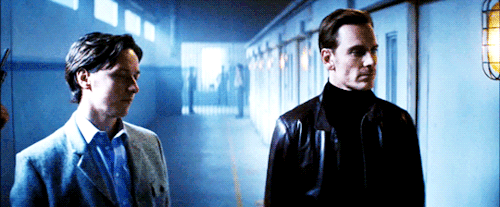
21) I laughed SO hard at this line the first time I saw the film.
Hank [when he hooks up Charles to Cerebro]: “Are you sure we can’t shave your head?”
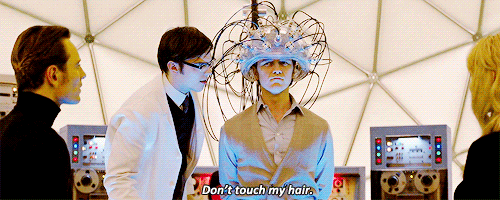
(GIF source is unknown [if this is your GIF please let me know].)
22) The montage where Erik and Charles find all the mutants to make up the first X-Men team is a slick way of covering a sequence which could have easily dogged down the pacing of the film. Instead, “okay, we need to find Angel and Havok and Darwin and Banshee...” they just cover it in about five minutes with upbeat music and clever pacing/editing.
23) The gay subtext in this film COULD have been much more obvious if they had kept this deleted (where Charles shows off his powers to angel):
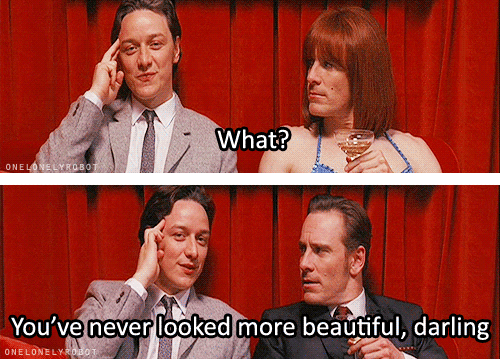
24) This is beautiful.
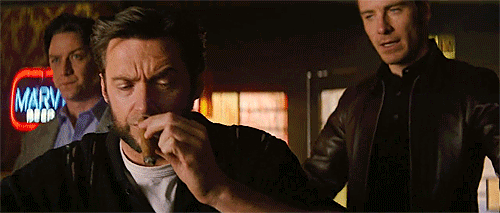
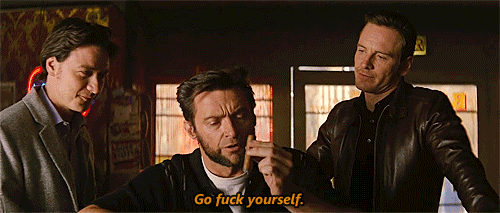
(GIF originally posted by @littlerebelrabbit)
According to IMDb:
Hugh Jackman accepted the opportunity to cameo as Wolverine, when he learned he would be the only character in the film to use the word 'fuck'. He improvised the line, "Go fuck yourself," after using seven other takes to say, "Fuck off". The reaction from James McAvoy and Michael Fassbender to the different line was authentic.
My entire process while watching this scene the first time was, “Hey, that guy looks familiar. Huh, he kinda looks like Hugh Jackman. Hey wait, that IS Hugh Jackman!” This is by far one of my favorite cameos in a film EVER and his appearance makes Hugh Jackman the only actor (to date) to appear in every film with the words X-Men in the title (he didn’t appear in Deadpool so he hasn’t appeared in every X-Men universe ever).
25) I mentioned in my recap for The League of Extraordinary Gentlemen that Jason Flemyng is one of my favorite character actors because of that film. Well he fills out Azazel’s red skin quite nicely.
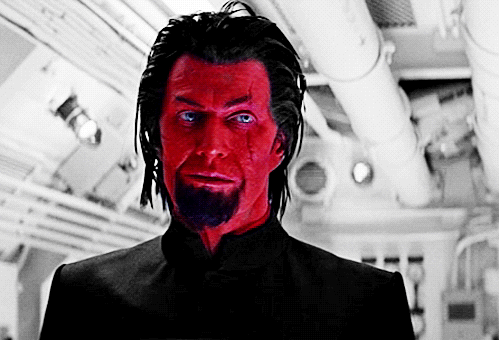
26) Charles and Erik’s scene at the Lincoln Memorial is very telling of their future rivalry.
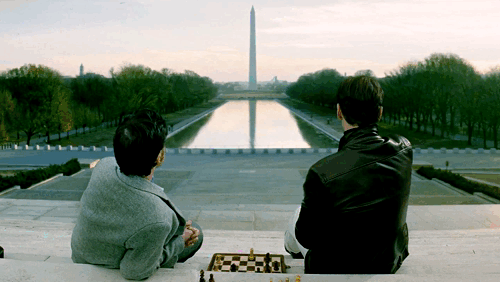
Erik: “Identification: that’s how it starts.”
This is where Erik’s naivety truly shines through. He actually believes he can convince humans to not be afraid of what they don’t understand, collectively. While Erik’s output might be a little more dower it’s also a little more realistic.
27) The bonding scene between the young X-Men is great.
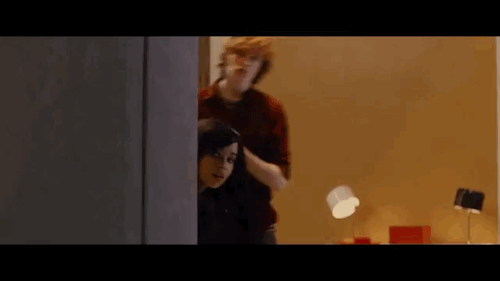
I’m a sucker for superheroes screwing around with their powers as a way to bond with each other (see: the party seen in Age of Ultron). There is strong humor throughout, each character is developed in simple yet unique ways and we begin to understand their relationships with each other. And it’s just a lot of fun to watch!
Note: I really like Zoe Kravitz in this film, but I think that speaks to her natural charisma more than anything else.
28) Professor Xavier is a jerk.
Charles [after he finds his new mutants comfortable with their powers, screwing around like the young people they are]: “I expected more from you.”
29) The way Erik tears through the Russian guard to get to Frost (and, by extension, Shaw eventually) shows how determined he is. He is ruthless and if anyone actively stands in his way he will tear them apart. It’s simple but powerful. The way he handles Emma also shows off this dedication, as well as the dissonance between how far he’ll go versus how far Charles WON’T go.
30) The “Children of the Atom” scene which showcases Shaw’s plan is nicely effective. It has a unique and impactful visual style and its simple enough that the audience isn’t dogged down by unnecessary exposition.
youtube
31) Shaw’s attack on the CIA is an incredibly strong turning point for the film. Outside of what’s been going on with Erik, the darkness of previous X-Men films has pretty much taken a backseat in this film. Until this moment. It’s when everything turns to shit, giving an unfortunate end to Oliver Platt’s character and showcasing Shaw’s powers in a unique and threatening way. The few issues I have with this scene are:
I wish we got more in Angel’s head about her decision to join up with Shaw; she does so then her character kind of disappears. It’s like she’s his new Emma.
Even in 2011, the black guy dies first.
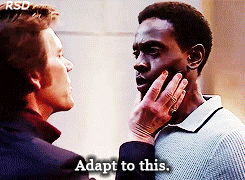
32) My brother and I both made this joke the first time we saw this film, so thanks to @jakegyllenhaal for putting it in GIF form.
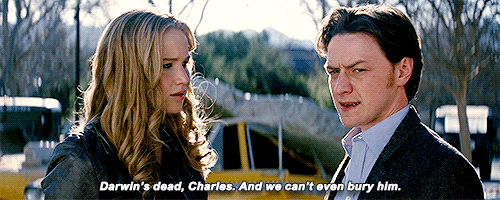
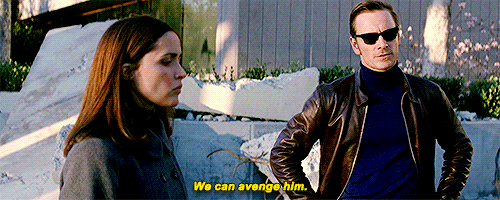
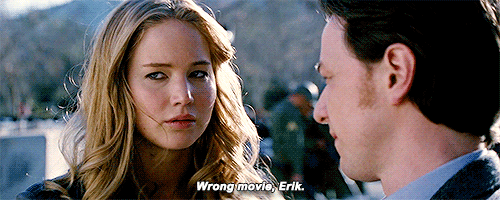
33) Okay, I might be about to get philosophical here.
Stryker: “In times like this, SECURITY is more important than liberty.”

(GIF source unknown [if this is your GIF please let me know].)
This is an issue in today’s modern age, but here’s the thing: liberty is more important than safety. Above all. “Give me liberty or give me death,” is a famous line that is basically one of the things this country is built on. So no, Security is NOT more important than liberty. Liberty and freedom above all. And if you have to compromise on security to do so than you should. At least, in my opinion.
34) X-Training.
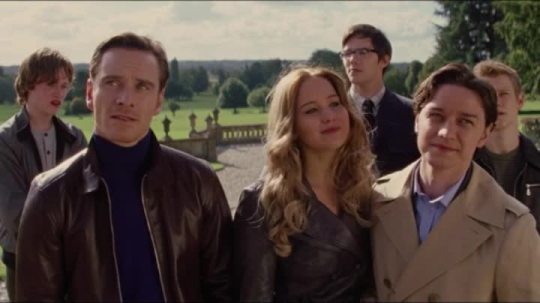
This is - in a lot of ways - what I’ve missed from the X-Men series. Charles actually being a teacher. Actually seeing the X-School in work and seeing students learn to master their powers. You know why Harry Potter is so cool? In part, it’s because we like to imagine taking all the classes. And now we’ve finally get that. It shows Charles being more of a teacher and growing into his role of Professor X more which is wonderful. Also - like the recruitment scene - the montage format is great. The editing and music keep it from dragging down the film. We could easily have spent like, “okay, two minutes on Beast now two minutes on Havok now two minutes on Banshee,” etc. But the montage makes it like a music video. Easily digestible, supported by Henry Jackman’s score, and just a lot of fun. Each character’s development is also continued, making them unique individuals who’s relationships with each other and personalities we understand. It’s just really great.
35) Glad to see they’re trying to maintain SOME continuity with the series.
Hank [about Raven]: “When you’re 40 you’ll still have the looks and sights of a teenager.”
36) Rage and serenity.
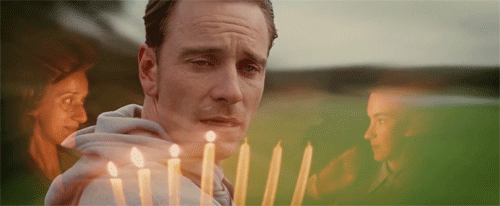
This is the moment of greatest trust and vulnerability Erik has with Charles. Erik trusts Charles enough to let him go through his mind and find his most intimate memory with his mother. It’s a holiday I assume (that’s a menorah so I’m thinking Hanukkah as Erik IS Jewish) and it’s this beautiful memory of someone he misses more than anything else. And it shows Charles who Erik is. It is the strongest moment in their entire relationship and defines it’s better qualities in a lot of ways. It’s pure character and I love it for that.
37) Hank and the cure.
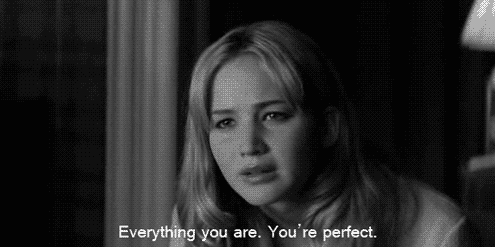
(GIF source unknown [if this is your GIF please let me know].)
There’s a strong juxtaposition between where Hank is with his self worth and Raven. Magneto has convinced Raven that she should be mutant and proud, that she should embrace her natural form. And she tries to do the same. It doesn’t exactly work though.
Hank: “My feet and your natural blue form will never be deemed beautiful. [Raven changes her skin back.] You’re beautiful now.”
Dude, you just said the girl you like will never be beautiful unless she looks like someone else. And I get that you’re projecting your own issues onto her, but also you’re words hurt her so much that she instinctively goes back into hiding.
Aka: the moment Hank and Raven would not get together (as of now).
38) Charles and Erik playing one last chess game before going to stop Shaw.
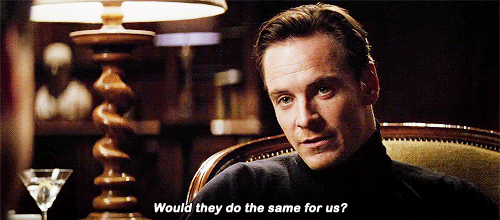
It is widely foreshadowing of the conflict to come between the pair and an unfortunate piece of dramatic irony for us as the audience. It is the showcase of the dissonance in their relationship at its most basic.
Charles: “Killing Shaw will not bring you peace.”
Erik: “Peace was never an option.”
That is just not applicable to Shaw for Erik, but humans as well. He’s not interested in peace with humanity, he’s interested in supremacy. As we saw in 2000′s X-Men.
39) Mystique seducing Erik always felt a little off to me. I know she’s mad at Hank and that Erik is the only guy in her life right now to make her feel totally comfortable with who she is (along with helping her be mutant and proud) but it feels a little unearned. I don’t get any sexual chemistry between them. I see a nice relationship but not a sexual one. Maybe it’s just me. But the Rebecca Romijn cameo is appreciated!
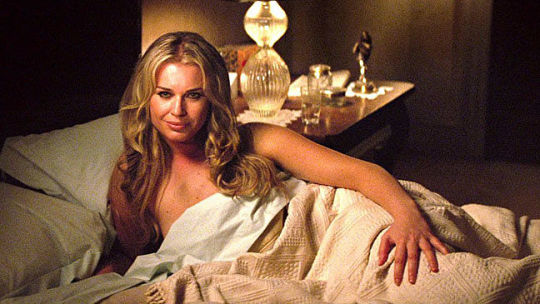
40) Hank’s gone into Beast mode.
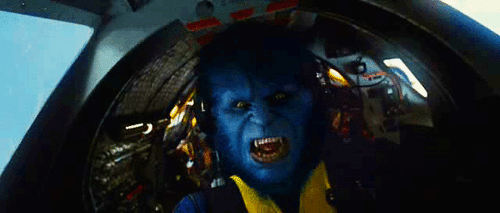
The practical makeup to get Hoult looking like the blue beast is incredible, because it IS largely practical with a bit of CGI to help enhance some areas. You begin to see a bit more of Kelsey Grammer in Beast now which is fun, but Hoult still makes the role his own. This is what helps him accept the animalistic instincts in him and reach the status of mutant and proud. It’s a great part of the film.
41) Now I’m just thinking about the first X-Men...
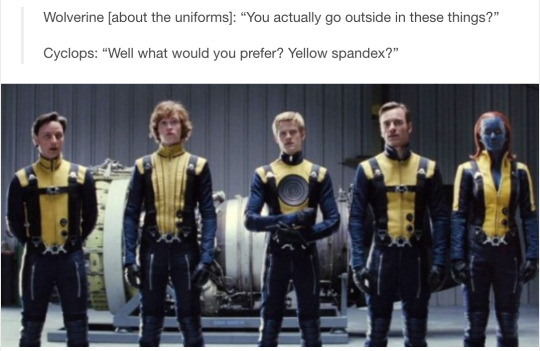
42) The climax of the film not only shows the team working well together but has some nice surprises in it (mainly when the Russians blow up their own ship). It’s best seen when the team find Shaw’s submarine and Erik says he’s going in. Charles does not question or second guess his teammate’s decision but works with it and sends him back up. It’s a lot of fun to watch this team in action.
43) Erik and Shaw’s final encounter.
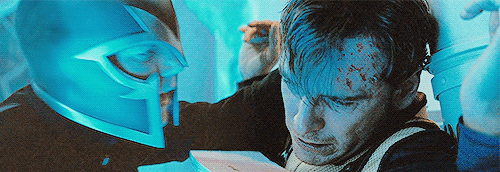
For most of this scene Erik is silent, just letting Shaw rail on him because it allows Erik’s telepathy to feed through. He says nothing until he’s about to be in control which takes a lot of self discipline.
Erik: “Everything you did made me stronger...That’s the truth. I’ve known it all along.”
And then what Erik says right before he kills Shaw is INCREDIBLY powerful especially when you think of the path Magneto goes down.
Erik: “I agree with every word you’ve said. We are the future. But unfortunately, you killed my mother.”
The way Erik ends up killing Shaw is so cruel and dramatic then, with the mirrored cinematography on Charles’ head (as he’s in Shaw’s mind) just driving the point home. He’s not just killing Shaw. He’s killing any kind of platonic relationship he could have with Charles too.
44) And so Erik’s transformation to Magneto is complete.
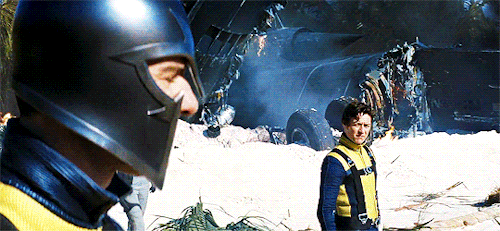
He is now the mutant leader we know from the first film, with his powers under full control. Now that he’s done with revenge he can move on to freeing his mutant brothers and sisters. He’s embraced not just his powers but his role as a leader of mutants and an enemy of mankind. And he’s tired of being vulnerable.
Charles [about the US and Russians Erik is about to kill]: “They’re just following orders!”
Erik: “I’ve been at the mercy of men just following orders.”
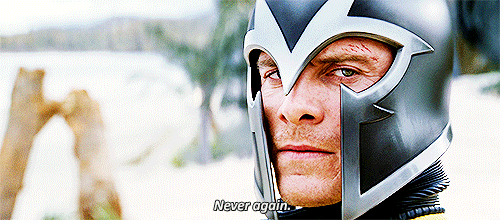
(GIF source unknown [if this is your GIF please let me know].)
45) The ensuing fist fight between Charles and Erik could have easily been based around powers. Charles could have used his telepathy to control Azazel or Angel or someone and send them in to fight Erik with him using his metal manipulation to throw them off. But you know what? Seeing this too just get in a freaking fist fight is much more realistic for their relationship, a lot more raw, and a lot more entertaining.
46) Well, if this isn’t a declaration of platonic (???) love I don’t know what is.
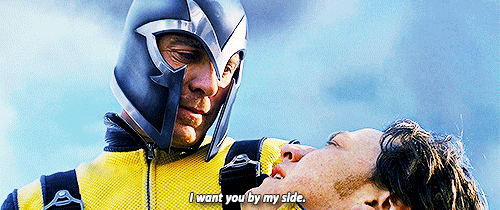
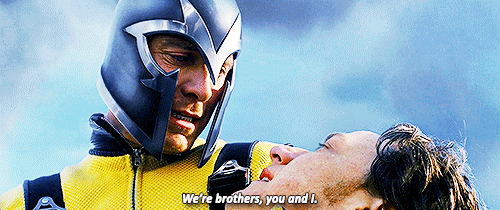
(GIF originally posted by @marveladdicts)
47) It’s nice to see Mystique not go straight for Erik to join him but to make sure that the person who is practically her brother is alright. And then Charles encourages her to go with Erik! It’s still a strong relationship even if it is in tatters.
48) Charles likes to fuck with people’s minds without consent. What he did to Jean in The Last Stand and now getting rid of Moira’s memories without even asking.
49) Oh man.
Moira [talking about things she half remembers]: “A kiss.”
[Room full of male CIA agents groan.]
CIA Agent: “Gentlemen, this is why the CIA is no place for a woman.”
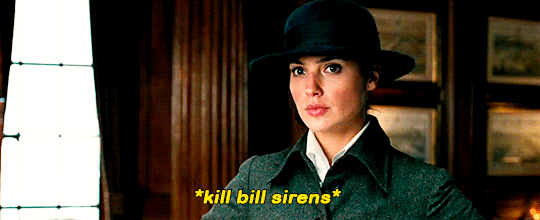
(GIF originally posted by @manofsteel)
50) The ending to this film is very solid, with Erik not only embracing his role as Magneto but also the fashion choice.
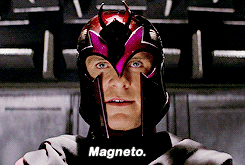
(GIF originally posted by @wonho-kihyun)
X-Men: First Class is an incredible amount of fun. Matthew Vaughn’s directing style gives the series a boost of adrenaline it desperately needed. Supported by memorable characters, a strong story with strong themes, and absolutely amazing performances almost across the board, this is the reason we still have X-Men films today. An absolute treat for first time viewers and old fans alike, you all should watch it.
#X Men First Class#X Men#Michael Fassbender#James McAvoy#Jennifer Lawrence#Epic Movie (Re)Watch#Zoe Kravitz#Oliver Platt#January Jones#Rose Byrne#Nicholas Hoult#Hugh Jackman#Matthew Vaughn#Kevin Bacon#Rebecca Romijn#Jason Flemyng#Annabelle Wallis#I See What You Did There#Loading
116 notes
·
View notes